








Fans say they will miss Symphony in the Flint Hills
By Jennifer Anima Flint Hills Media Project
As the sun dipped behind a tallgrass prairie pasture in Chase County, Matt Lynch was one of nearly 8,000 people who stood up to sing “Home on the Range.” Many had tears in their eyes.
Lynch drove almost two hours from his home in Wichita to experience the last Symphony in the Flint Hills, held on June 14. The event was started 20 years ago to bring music and attention to the tallgrass prairie.
By Bonnie Bing
Eight decades into her love affair with ballet, Ruth White still performs every move with her students.
Warming up a class recently, she sat
on the floor and extended her legs in a wide V.
“Back straight, now lean forward,” she said, stretching until her own forehead touched the floor.
It’s no wonder the petite 92-yearold seems decades younger. Her joyful approach to life extends far beyond dance.
White, who’s called Wichita home for seven years, grew up in Austin, Minn.
“I had two brothers, so I was a total tomboy,” White said. “I climbed trees, played football, scaled the walls at our school. That’s when my mom said, ‘That’s it! You’re going to dance
school.’ I went and loved it.”
When she was 16, two women asked if she would teach their children dance. The moms found a big room with a wood floor on the second floor of a bottling company.
Lynch has attended the event with his wife, Mindy, since 2017. That year, the event took place closer to home for them, on Rosalia Ranch in Butler County. The couple came to love the Flint Hills enough to buy a second home in Strong City, just seven miles from this year’s event.
While in Wichita, he and his wife work government jobs. On the side, Lynch is a woodworker who uses their second home as inspiration.
“I enjoy the city,” he said. “I enjoy being, like, 60 seconds from Dillons
See Flint Hills, page 6

“I thought it was a palace,” White said. “I opened my own school of dance, 25 students right off the bat, and that began a long career.”
During her career, she performed
with the Rochester Minnesota Ballet Company. “But for many
See Ballet, page 7
The Active Age is tightening up our distribution process to save money on postage and printing.
Over the years, as subscribers have moved or died, copies of The Active Age have continued to be delivered to some of the addresses where they previously lived. Some current occupants no doubt enjoy receiving the publication, but others simply toss
it in the trash can.
With the rising cost of postage, that is an expense we can no longer afford. Starting with our August 2025 issue, those addresses will no longer receive copies.
If you are currently receiving a copy of The Active Age addressed to your name (a last name and first initial are sufficient), you do not need
to do anything to continue getting it. However, if you are receiving a copy addressed to someone else, you must request your own subscription to continue receiving one. You can use the form on page 7, visit the activeage. com (click on “Get the Paper”) or call us at (316) 942-5385 to subscribe.
See Mailing list, page 7
Donate at least $25 to The Active Age and you could win a 14-carat white gold diamond necklace valued at $2,000.
Talk about a way to lose those summer doldrums!
The Active Age will hold a drawing Aug. 1 for a diamond necklace donated by Mike Seltzer Jewelers. Everybody who donates at least $25 between now and July 31 will be entered in the drawing. Donate $50 for two chances, $75 for three chances, etc. Donations can be made in person
or by mail to The Active Age, 125 S. West St., Suite 105, Wichita, KS, 67213; by phone by calling (316) 942-5385; or by visiting our website, theactiveage.com.

Proceeds from the drawing will help us continue bringing you The Active Age each month.





Our professional, insured, and courteous craftsmen will come to you. We arrive on time, clean up after the project and our work is guaranteed.


When: Aug. 27, 2025
Where: Wichita State Metroplex, 5015 East 29th Street North Wichita, KS
Time: 10 a.m. - 2 p. m. Join AARP Kansas and the Central Plains Area Agency on Aging for a day of workshops and resources focusing on

Starla Criser dabbled in a number of careers before finding what may be her true occupation — volunteering with seniors.
“They’re good people and I’ve enjoyed them all these years,” Criser said.
In May, Criser was recognized as the 2025 Irene Hart Award winner. The award, named for a former director of Central Plains Area Agency on Aging, recognizes excellence in service to seniors.
Much of Criser’s volunteering has involved helping seniors put down their stories in writing. She’s a published author herself, with children’s books, romances and other genres to her credit.
On her website, Criser recounts her past as a a coffee shop owner, legal secretary, receptionist and "mediocre waitress."
She tried college several times before finally graduating with a gerontology degree from Wichita State University.
That led to an internship and job with Senior Services, Inc., as
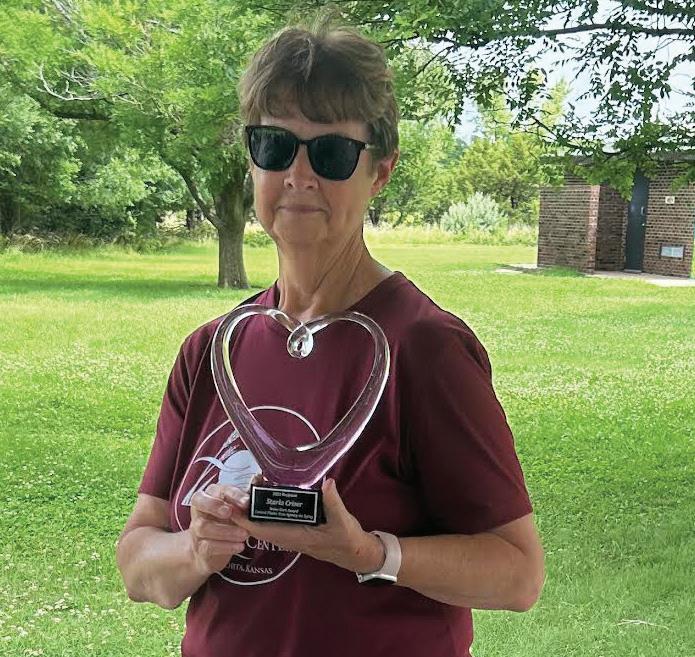
coordinator of the Neighborhood Connection program. She then transitioned to three decades of volunteer work.
Criser is president of the Linwood Senior Center advisory council and also leads the Seniors Exploring Cultural Arts group. She established Writing Craft groups at four senior centers: Linwood, Downtown, Derby and Haysville. That’s led to five published collections of work by


senior center writers and a community cookbook.
“Most people are really wanting to write their memoirs. We’ve toyed around with writing fiction, but that’s not what they’re really after."
Cherise Langenberg, director of the Linwood center, said Criser is invaluable, planning, decorating and helping sponsor various events like a Senior Carnival and a holiday bus trip to Kansas City.
“Her mentorship, ideas and encouragement have been priceless to me as a director and to the seniors we
serve," Langengberg said.
A founding member of the Kansas Writers Association, Criser has also volunteered with the Sedgwick County Zoo, Botanica and Music Theatre Wichita. She’s married to Steve Criser, a member of The Active Age’s board of directors.
Criser has quite a few other interests as well, from travel and scrapping to gardening and quilting. And she’s tried kayaking, deep-sea fishing and ziplining. “Age doesn’t define me…I am a firm believer that age is not a restriction to learning and taking a chance at doing something outside your comfort zone.”





By Susan Armstrong
Memories of my childhood come flooding back every summer: bare feet on a hot sidewalk, the fragrance of freshly cut grass, hot dogs from a grill and endless games of “Annie, Annie, Over.”

When I was around eight years old, we made a baseball diamond with cardboard bases on the empty lot behind our house, where all the
neighborhood girls and boys showed up for spontaneous games late in the afternoon. If it was too hot for baseball, we climbed trees or built forts, or huddled together listening to someone’s transistor radio.
I remember the freedom of long sunny days when we left the house in the cool of the morning and stayed out until twilight. We ran through the sprinklers in our bathing suits, read books from the Bookmobile and

rode bicycles with our friends. Some nights, we poked holes in the lid of empty pickle jars and used them to catch fireflies, releasing them all before bedtime for our own light show.
One of my favorite memories is of Fourth of July celebrations, when my mother made the best peach ice cream in the world. She began with ripe peaches from Blood Orchard in south Wichita.
My sisters and I hovered near her in the kitchen, watching as she sliced the peaches into a blender and mixed them to a pulp. Then she’d stir that into a base of heavy cream, whole milk, sugar and eggs.
Meantime, Dad pulled out the old-style wooden ice cream maker and packed it with ice and rock salt. In true Tom Sawyer fashion, my dad turned
the crank with such enthusiasm that we girls begged to help.
If you’re like me, one of life’s greatest pleasures is recalling memories like these. Another is reading The Active Age — where I always discover fun feature stories, tips on where to go and what to do, and plenty of bargains from local merchants who support the paper with their advertising.
The Active Age’s small team is devoted to bringing you a top-quality newspaper every month, free of charge. Show them you appreciate their work by sending a donation, if you’re able. Every dollar counts.
Meanwhile, have a wonderful summer filled with warm memories, good friends, and peach ice cream.
Susan Armstrong is a member of The Active Age’s volunteer board of directors. A retired marketing executive, she writes cozy mysteries as Anna St. John.


Jana Abbott
Jerry Allen
Joyce Allen
Ronald Ast
Harold Baalmann
Greg Baba
Dwayne Baldwin
Retta Bass
Edward Bender
James Bevilacqua
Anne Bilson
Linda Bisbee
Dorothy Blake
Ronald Bogard
Diana Breit Wolfe
James Brewer
Scotty Bryan
Karen Bryant
Jaye Ann Buehler
Richard Burgeson
Robert Cairns
Tony Catanese
Newton Cates
Bonnie Chadick
Glenda Cherry
Mary Ciccone
Harold Connell
Jim Crawford
Steve Criser
Pamela Tabor
Fonda Tamage
Janice Telford
Jo Ann Temaat
Bonnie Thompson
Janet Crosby E. Viola Crouse
Linda Lea Davisson
James Day
Karen Demel
David Dickeson
Diana Dobbins
Jill Docking
Julie Dombo
Carl Donham
Claude Donham Jr
Billie Duval
Donna Felix
Casey Furnish
Richard Gibson
Carol Glidden
Jeanne Gnagy
Glen Goering
Stanley Goertzen
Sandra Griffin
Barbara Griffith
Marilyn Grisham
Brenda Halverson
Donna Harkness
Ernest Harris Jr
Joanne Hartenstein
Marlene Hayes
Betty Hemmen
Rene Hendricks
Barbara Hillier
Lyneta Hollingsworth
Wilma Hunt
Phyllis Ioerger
Elizabeth Jabara
Lana Jones
M. Khoury
Rosalie Klocke
Camille Kluge
Ruth Ann Koepsel
Rebecca Kohler
Alys Kowing
Marian Krallman
Mary Kringen
Dixie LaBrue
Susan Lambing
Carolyn Lancaster
Dale Lanham
Donna Lehane
Sharon Lehman
Louise Lind
Carol Lindley
Michael Lindsey
Tom & Lori Lohrenz
Nita Long
Anne Luke
Debra Lynn
Mary Beth Manion
Ernest Manny, III
Theresa Marsh
Joe Ellan McInnis
Debra Messamore
Judith Mielke
Robert Mies
Joseph Miller
Judy Mitts
Margaret Moore
Jackie Morgan
Lorraine Morgan
Susan Morgan
Carolyn Morris
Harry Neel
Alberta Nichols
Lyle Noordhoek
Michael Owings
Dwight Oxley
Michelle Palmer
Vicki Patrick
Doug Patry
Norma Peak
Beth Pent
Jack Perry
Ann Peterson
Dorothy Peterson
Martha Poinsett
Kim Potochnik
Jon Prather
Belinda Preskorn
Rita Pressnall
Regene Prillman
Marie Prochazka
Kat Rajewski
Georgia & Keith Ray
Stacia Razook
Gary Regier
Jerry Resser
Marilyn Robinson
Patty Ruzich
Deena Sawyer
Chris Schaeffer
Kay Self
Glynda Shoff
Keith Showell
Jim Siebert
Judy Siemens
Denise Simon
Carole Smalley
Alan Smith
Reid Smith
Ruth Smock
Elizabeth Snow These readers recently contributed $50 or more to the 2025 donation campaign.



James Spangler
Jennie Stephan
Victoria Throckmorton
Lise Ann Van Arsdale-Hansen Duane Van Camp
Carrie Van Sickle
Linda Lea Voss Sharon Waner Bill Warren
Wellemeyer Debra West
Whetzel Gail Williams
Willis
Wilson
Woods Cheryl Wortman Lue Yarnold Jr Janlin LLC

Ziegler Donate via our

code This QR code will take you to The Active Age’s secure PayPal donation page.



From Page 1 and QuikTrip and Andy’s Frozen Custard and all those things, but you get out here and it’s just simpler and quieter.”
“It’s kind of like a weekend here can feel like a week.”
Sue Evans, who drove with her daughter and grandson from Lee’s Summit, Mo., to attend, felt the same way.
“I think it’s so important that families do things like this together and enjoy nature,” she said.
The event has moved around Flint Hills locations over the years, but Chase County is where it began and where the organization’s office is located. This year’s event was held on land owned by the Evans family, who also hosted last year’s concert, on a ranch they own in Greenwood County.
“There’s only 2,500 to 3,000 people that live in this county,” Lynch said.
“There will be twice that here today. I think giving that to people so they can see it is important. And I don’t know what’s going to replace that.”
Fans grew used to navigating miles of gravel roads, traipsing across prairies and braving whatever Kansas weather had in store to enjoy performances by the Kansas City Symphony.
In addition, the event always featured a full day of educational talks, prairie walks and other activities aimed at highlighting the Flint Hills.
One of the most popular was the cattle drive held behind the bandshell as the symphony played “Home on the Range” and audience members pitched in.
Beth Harshfield, a Wichita resident and member of the first Symphony in the Flint Hills board of directors, said the first cattle drive wasn’t planned. The music — in particular a loud drum section — caused the cattle to run.
“And everybody said, ‘How in the heck did you make that happen?’ So

from then on, we had to have a cattle drive,” Harshfield said. “But that was, you know, it was just inspired by the music and it was fun.”
Many people looked forward to the smaller events following the big concert, such as this year’s dance featuring country music recording artist Logan Mize, a Clearwater native.
“Everybody’s here for the same reasons,” said Lynch. “And so, it’s kind of nice to see that. So yeah, it does feel like a family of everybody sitting around with these uncomfortable straw bales and listening to music or speeches.”
After the final notes of “Home on the Range,” Native American performers danced in traditional attire.
Organizers say the Symphony in the Flint Hills naturally ran its course, but they are looking for suggestions for a new event. Lynch said he hopes a smaller group of people can still be brought to the Flint Hills to celebrate each year.
“It just won’t be replaced,” he said,
I am writing to ask that Wichita residents email your City Council Representative and the Mayor and ask that they not cut the Parks Department budget for planting trees. The emails of City Council members and Mayor Wu are below.
Essentially, the City Manager is proposing to save $180,000 in cuts to the Park Department by continuing the City’s moratorium on planting trees. As you may know, the City of Wichita ranks dead last among Cities of equal or larger size in per capita expenditures on Park operations and forestry according to the national survey conducted every year by the Trust for Public Land (https://www. tpl.org/parkscore). Cutting our Parks will mean we will fall further and
further behind. It is not a solution to the City’s deficit problem and it continues the decade and a half long practice of taking away resources from our Parks, trees on our rights of way and other public sites, in order to make up for a lack of prudence in how the City spends its money.
Please email everyone on this list. They will listen to you even if you aren’t in their District. Of course, Mayor Wu represents all of us. We need to educate our elected officials about the value of trees to our community! Please let them know why maintaining and growing our urban tree canopy is important to you and your family.
Mayor Lily Wu lwu@wichita.gov
Dist 1 Brandon Johnson bjjohnson@wichita.gov
Dist 2 Becky Tuttle btuttle@wichita.gov
Dist 3 Mike Hoheisel mhhoheisel@wichita.gov
holding back tears. “The opportunity for everyone to come together like this in this kind of location. When this goes away, it’s just kind of one more thing from the Flint Hills that goes away.”
Editor’s note: Jennifer Anima is a senior journalism student at Wichita State University. Owen Prothro contributed to this article. This story was reported and written as part of the Flint Hills Media Project, an experience-based learning project through the Elliott School of Communication at Wichita State University.

since 2017.
Dist 4 Dalton Glasscock dglasscock@wichita.gov
Dist 5 J.V. Johnston jvjohnston@wichita.gov
Dist 6 Maggie Ballard mballard@wichita.gov
Harold Schlechtweg

From Page 1
years I presented my own ballet performances,” she said. Often, she created the story and scenery, designed the costumes and performed.
“I drove my family crazy,” she said. “After every program, I’d tell them I would never do another one. That went on for 52 years.”
Later, she decided she needed a new adventure. One of her sons had moved to Alaska. “I sold my dance school, packed up my car, took my dog, Toto, and drove to Alaska,” she said. “I stayed there eight months and it was quite an adventure.”
White, who’s been widowed for 14½ years, now has one son who lives in Wichita, another in Thailand and a daughter in Minnesota.
She considers teaching and bringing people together her life’s mission. After living in Wichita for a year, she invited neighbors to join a Bible study and prayer group. She didn’t get much of a response.
“I thought, ‘what do women like to do?’ Exercise!” she said.
So she mentioned to neighbors that she’d love to start teaching stretching exercises and “her own version” of ballet to a group. White
has a studio in her basement and was already teaching children who are homeschooled.
Soon, several female neighbors started gathering twice a week in the studio. Participants say they love the sessions, not only for the physical benefits of moving but for the encouragement they receive.

“And now we are praying together,” White said. “Our motto is: Better Together.”
One of her favorite activities is taking her young students to perform in nursing homes four times a year. “I give these children the opportunity to put on programs for grandmas and grandpas, but they aren’t just performing, she said.
Upon arrival, each child says into a resident’s ear: “You are beautiful and Jesus loves you.”
“And when they leave there are hugs. Lots of hugs,” White said.
Dance is just one ingredient in White’s recipe for happiness.
“First, fall in love with Jesus. Love yourself. Love your neighbors. Reach out and help other people. Be smart

about what you eat. Be sober because you don’t need any artificial substance to stay happy. And love children. They keep me young, even if I can’t always hear what they’re saying.”
And with a big laugh she added, “Maybe I don’t want to know.”
Reach Bonnie Bing at bingbylines@ gmail.com
There is no charge, although donations are accepted and appreciated. The Active Age is a nonprofit 501(c)(3) organization.
We apologize for any inconvenience but this change will help us keep bringing The Active Age to people who want it. We also ask:
If your home or place of business is receiving duplicate or unwanted copies

of The Active Age, please let us know by calling (316) 942-5385 or emailing joe@theactiveage.com.
If you are comfortable reading online, please consider switching to the digital version of The Active Age, which is delivered to subscribers via email each month. Request it by calling (316) 942-5385 or emailing joe@ theactiveage.com.
Mail the completed form below to The Active Age at 125 S West St, Ste 105, Wichita, Ks 67213.

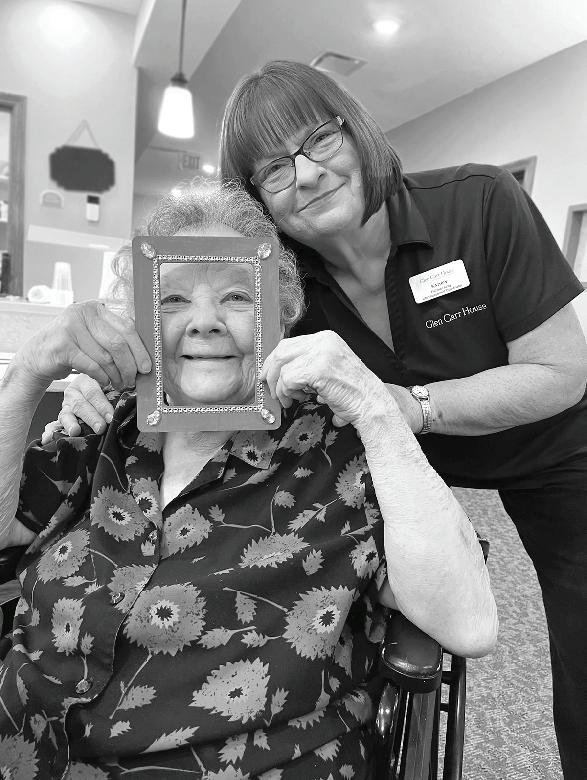


By Ted Ayres
In May, my review of “The Shadow of War,” Jeff Shaara’s novel about the Cuban Missile Crisis, appeared in The Active Age. Subsequently, I was copied on an email to Shaara from Dave Leiber, a Butler County resident who experienced the dramatic event up close as a young U.S. Marine. I reached out to Leiber to learn more.
Leiber told me he graduated from Waterville High School in northeast Kansas in 1960. An athlete for the Yellow Jackets, he received a scholarship offer to play basketball at Butler County Community College. However, being more interested in “seeing the world” than academics, Leiber followed a buddy into the Marine Corps in October of that year.
After Advanced Infantry Training at Camp Pendleton — Leiber told me that in the Marines, you were always an infantryman, regardless of any specialized training you subsequently received — Leiber was assigned to Marine Occupational Specialty 6511, Aviation Ordnance. This explains his later connection to the missile crisis.
In September 1961, Leiber was stationed at Marine Corps Air Station, Cherry Point, N.C. His squadron was deployed to Puerto Rico for a month to provide live fire opportunity for Marine pilots of the A4D-2N Sky
By Nancy Wheeler

Hawks. Each Sky Hawk could carry a maximum load of 4,500 pounds of ordnance consisting of bombs, missiles, rockets, napalm, 20 mm cannon and two different tactical nuclear weapons.
In October 1962, Leiber’s squadron received orders to deploy to the USS Enterprise, the world’s first nuclear powered aircraft carrier, boarding the ship off the coast of Florida as it steamed
south. The Enterprise was one of five Second Fleet carriers participating in the “quarantine” of Cuba, a phrase used instead of “naval blockade” for political and diplomatic reasons.
On the evening of Oct. 22, 1962, President John F. Kennedy spoke to a national television audience about the presence of Soviet missiles in Cuba.
Leiber told me that during his first three days on board the Enterprise, his crew got approximately three hours
of sleep as they loaded ordnance onto the Sky Hawks for a potential strike mission into Cuba. After the aircraft were armed, Navy and Marine pilots occupied the planes during their shifts, with sealed orders on their mission in the cockpit.
When I asked Leiber if his squadron was advised as to the purpose of the deployment to the Enterprise, he said they were not initially. His squadron only learned of the crisis after three days of constant effort to equip and arm the Sky Hawks.
I also asked Leiber if he was worried for his personal safety and the well-being of loved ones back in Kansas. He told me that the initial days of his deployment were so intense that the only thought he had was getting his mission accomplished successfully.
Leiber is now 83. He retired from farming and working in the aircraft industry in Wichita. He is proud of his service in the Marines and on the USS Enterprise and deservedly so. Although Leiber did not necessarily see the world, as he intended upon enlistment, he was part of an important effort to save it.
(And, by the way, Leiber received an acknowledgement and nice reply from Shaara.)
Contact Ted Ayres at tdamsa76@ yahoo.com.
As we celebrate July 4th, it’s time to review our knowledge of key figures in American Revolution. See if you can identify these personages from the clues given. The answers appear below.
1. What silversmith is known for his famous ride to warn the colonists that the British were advancing?
2. Who authored the pamphlet “Common Sense” to set forth a powerful argument for American independence?
3. What naval hero led successful raids on British ships and once said that he had “not yet begun to fight” even though his own ship was in flames?
4. What publisher and inventor acted as the main negotiator who sealed the alliance with France during the Revolutionary War?
5. Who was the Commander-inChief of the Continental Army during the Revolutionary War?
6. What Founding Father served as an aide-de-camp to George Washington during the war and
became the first U.S. Secretary of the Treasury?
7. What Bostonian was a prominent figure in the Boston Tea Party, helped organize the Sons of Liberty, and signed the Declaration of Independence?
8. What soldier and frontiersman led the Green Mountain Boys to capture Fort Ticonderoga from the British in 1775?
9. What Continental Army captain and Revolutionary War hero volunteered to gather intelligence on British troop movements and was hanged as a spy?
10. Who played a crucial role in the Revolutionary War, primarily as a leader and writer, drafting the Declaration of Independence?
11. Which Virginia Governor was a passionate orator known for his fiery speeches claiming, “Give me liberty or give me death?”
12. Who was the British King during the American Revolution whose reign was marred by losing the American colonies and succumbing to madness?
Answers:
1. Paul Revere
2. Thomas Paine
3. John Paul Jones
4. Benjamin Franklin
5. George Washington
6. Alexander Hamilton
7. Samuel Adams
8. Ethan Allen
9. Nathan Hale
10. Thomas Jefferson
11. Patrick Henry
12. King George III

By Blaise Mesa
The Beacon
Stacy Crow made sure to check the outdoor cameras at Shirley Crow’s house in Wichita every now and again.
Stacy lived five hours away from her 85-year-old mother-in-law, and the video check-ins were necessary because Shirley had Alzheimer’s disease and needed regular medication.
“We did like to just see her out on her porch drinking coffee and know she’s doing well,” Stacy said. “Even just be able to say good morning to her through that Ring (camera).”
Shirley was strong-willed, independent and always took care of others. Stacy said she was the loving backbone of the family.
Shirley’s health began to decline last year, and she was spending time in the hospital. That’s when the Crows noticed Shirley wasn’t taking all her medication — sometimes missing weeks worth of blood pressure medicine and blood thinners. Shirley was also missing appointments.
Shirley was supposed to be looked after by a caretaker, but the family says the caretaker failed to do that job.
Missing medication
Stacy filed a Kansas Adult Protective Services report on Oct. 5, 2024. Throughout the rest of the month, Shirley was back in the hospital, and the Crows alleged more medicine was missed. Shirley died just weeks later on Nov. 2.
The caretaker named in the Adult Protective Services complaint declined to comment for this story.
The case is still open eight months later. Stacy has asked for updates, but the caseworker looking into alleged mistreatment has 70 other people on her caseload. There just isn’t time to investigate everything she has.
“We got an investigator that I truly believe has a heart. She was very kind,” Stacy said. “I understand they have an overwhelming demand. I don’t fault them. I just want things to change.”
10,000 cases per year
The Crow case is just one of more than 10,000 adult maltreatment cases investigated in Kansas each year.
Alone, the case doesn’t suggest any larger issues with the system. So The Beacon asked the Kansas Department for Children and Families what an investigator’s average caseload is, but the agency doesn’t share that information.
A previous version of this article said the agency doesn’t track the numbers. The Beacon asked DCF multiple times why it doesn't track the information, but DCF declined an interview.
“I don’t have staff caseload numbers,” said Erin La Row, DCF spokesperson.
Eventually, La Row said case assignments aren’t shared because they are considered confidential. The Beacon then tried to clarify whether the agency tracked caseloads but didn’t share the information, but the agency declined to comment.
“I don’t have anything to add beyond what has already been provided,” she said via email.
DCF won't share numbers
It was only after the story was published that DCF clarified that it does track caseload information, but it just doesn’t share it.
La Row said a general idea of caseloads can be found by dividing the regional caseload assignment by the number of investigators in that area.
In February alone, there were 199 new cases assigned in the Kansas City area and 17 case investigators. Wichita had 240 new cases assigned — the most of any region in the state that month — and also had 17 case investigators. That’s an average of 12 new cases for a Kansas City area investigator and 14 for a Wichita APS staffer.
A single month’s assignments isn’t an accurate way to calculate caseloads, though. Caseworkers carry over cases from previous months, and it isn’t clear how often that happens because DCF doesn’t publicly share the average number of days cases are active.
'Just isn't sustainable'
Lori Delagrammatikas, retired executive director of the National Adult Protective Services Association,


said 20 to 25 cases a month is a desirable range, though others say that number isn’t a good representation of a healthy workload. A caseworker could manage 35 cases, but even that number is pushing it. Seventy cases just isn’t sustainable.

“When you’re starting looking at numbers like that,” Delagrammatikas said, “you’re either going to screen out people and not investigate what happened to them or it’s going to be slow.”
Reported cases are also increasing. The population is aging and DCF has seen a 9% increase in assigned cases since 2023. There were 9,700 assigned cases in fiscal year 2023 and 10,608 in fiscal 2024.
Agencies should always strive for manageable caseloads, but caseloads aren’t a perfect indicator of how busy an investigator is, said Bill Benson, national policy adviser at the National Adult Protective Services Association. Some cases are more nuanced and complicated — taking more time to investigate.
Timeliness important
Benson said timeliness in investigations is important. In fiscal year 2024, 98.7% of assigned cases had timely contact with the person, DCF data said. In February 2025, the number was 99.6%.
Timely contact means a face-toface visit within 24 hours if the agency thinks someone is in imminent danger, three days for all other reports of abuse and five days for reports of neglect or financial exploitation.
Benson said there’s no reason to believe Kansas is falling behind in adult protective services. Delagrammatikas said she’s seen Kansas roll out innovative staff retention policies.
There’s no clear data to show that Kansas is systematically failing to investigate cases. These systems do lack gold-standard data, though.
Advocates said they’d like agencies to track satisfaction with case outcomes. How quickly cases are closed could also be helpful, but that also is flawed — complicated cases take more time.
“If ever we get to kind of a holy grail (of data),” Benson said, “we’ll be able to measure things from a quality or qualitative standpoint.”
Kansas also can’t accurately be compared to other states to see how well it investigates alleged adult maltreatment. State-by-state data is just too fractured.
In some states, one caseworker investigates a complaint before that complaint is handed off to another caseworker to address the issue. In some states, that’s just a single staffer. States might also define types of abuse differently.
Until recently, one state didn’t investigate financial fraud unless it was federal money. Stealing from someone’s pension wouldn’t trigger an adult protective services investigation, but Social Security fraud would.
Gold Standards
Delagrammatikas is trying to fix this. She chairs the nationwide Gold Standards committee, a group of state officials trying to standardize APS policies. That means agreeing on similar definitions of abuse and neglect.
She said the group does talk about what data should look like, but states first need to hammer out the other variations in adult protective services before it can get there.
State adult protective services vary so widely because funding is so different. The federal government in 2022 approved $15 million in APS money, the first time federal money was set aside. But the Trump administration has proposed cutting all of it. Massive cuts to other social services programs are also proposed.
Those cuts will affect senior centers, Meals on Wheels, utility payment programs for seniors and other benefits, Delagrammatikas said. The Gold Standards committee may also stop meeting if that money is cut because state agency staff will be too busy managing the fallout.
“It’s going to be a cascading effect,” she said, “and a lot of people are going to be seriously harmed with this.”
Blaise Mesa is The Beacon’s Kansas Statehouse reporter.
By TyJuan Davis Community Voice
In a quiet Wichita home filled with memories and music, 90-yearold Henry Walker reflected on a life shaped by opportunity, hardship and perseverance. A lead guitarist who began playing at age 27, Walker never chased fame, but built a legacy through resilience.
Walker’s entry into music came by chance. Asked to fill in for a missing bass player, he picked up the instrument with no prior training. He credits the late Barry Harris and peers with helping him learn. That impromptu gig sparked a journey lasting more than six decades.
Born and raised in Pine Bluff, Ark., Walker grew up surrounded by gospel and blues. He recalled how music was part of everyday life, even if opportunities for black musicians were limited.
“Back then,” he shared, “you didn’t plan to be a musician, it found you.”
Despite a late start, Walker’s dedication and natural talent led him to join several local groups before cofounding The Regents. He noted that the band became more than a group of musicians—it became a brotherhood.
Their music resonated with those who felt unheard and unseen — people burdened by daily struggles, searching for something to lift their spirits, even if just for a moment.
As the band’s popularity grew across Wichita and the region, Walker stayed grounded.
“We had to be tight. Not just in how we played, but in how we treated

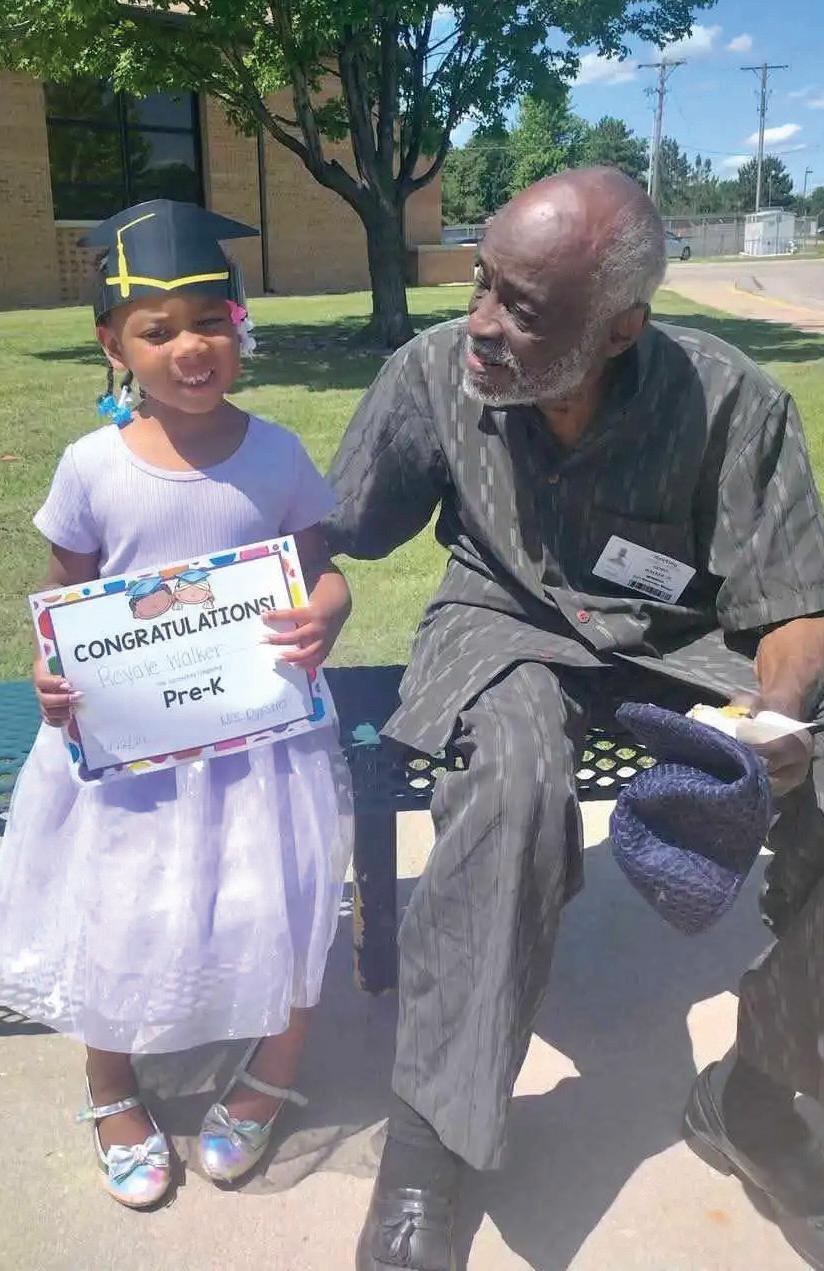
each other,” he said.
Walker navigated racism both on and off stage. He spoke of being barred from restaurants, forced to enter through kitchen doors, and denied access to a lot of places in Wichita.
“You had to know how to handle things,” he explained. “If you argued, you were going to have problems.”
But music gave him a way to defy those restrictions. He performed in venues acrosås Wichita, with audiences that included governors and senators. He remembers even being welcomed into clubs like the Candle Club, which is still his favorite venue.
“They tipped good and treated
us right. For a black man navigating systemic racism, that meant more than just money. It meant dignity.”
“My dad never looked for recognition. He just helped others, gave what he had. If they didn’t have an instrument, he’d buy it for them or get it out of the pawn shop,” said his son, Henry Walker III.
He recalls his father having him and his siblings up at night practicing music or hosting others.
“Through it all, he could’ve chased the spotlight, but he chose to raise us instead.”
He remembers the dedicated father who worked at Safeway, then
If you’re watching kids this summer on a tight budget, two programs could help.
Free breakfasts and lunches are being offered to children at 33 locations as part of the Wichita Public Schools Summer Food Program. The program runs through July 25. The free meals are available to all children ages 1-18, not just WPS students or students who qualify for free/ reduced meals. Visit www.usd259.org/ summerfood for locations, times and menus.
This summer, WPS will operate two different types of sites. The majority will be dine-in sites, where children have to be present and meals must be consumed on site. No application or registration is needed for dine-in sites.
The USDA has designated Southeast High School as a rural school, allowing WPS to offer a
week’s worth of grab-and-go meals at this site only. Children don’t need to be present, but a parent or guardian has to pick up the meals. Online registration is required each week to receive meals and will be capped at 3,000 children. Visit www.usd259.org/ summerfood for more information and to register.
The Kansas State Department of Education and the U.S. Department of Agriculture sponsor the Summer Food Service Program.
Also, nearly 20 local attractions are participating in the 2025 Kansas Tourism Sunflower Summer program, Visit Wichita announced.
The Sunflower Summer Program is a benefit for Kansas families with school-aged children to encourage them to explore Kansas. Eligible Kansas families can download the Sunflower Summer App to claim tickets to participating venues. One adult ticket is eligible for free
admission with eligible students. The 2025 Sunflower Summer season will run from July 12-Aug. 3.
In Sedgwick County, participating attractions include: Botanica Wichita, CityArts – City of Wichita, Derby Historical Museum, Exploration Place, Field Station: Dinosaurs, Great Plains Nature Center, Kansas African American Museum, Kansas Aviation Museum, Kansas Wildlife Exhibit, Mark Arts, Mid-America All Indian Museum, Museum of World Treasures,
Farmland and eventually Smithfield to provide for his family instead of chasing a career in music. Walker has no regrets. His legacy isn’t defined by charts or record sales, but by how he consistently showed up for his family and the community. Young musicians sought his guidance, and families remember his heartfelt performances at weddings, funerals and local celebrations. Now facing health challenges, Walker still plays when he can, still contributes his sound to a cause or a community gathering. His partner, Lucy Griffin, describes him simply as “a very good person with a heart of gold and an ear for music.”
Old Cowtown Museum, Sedgwick County Zoo, Ulrich Museum of Art, Wichita Art Museum, Wichita Sedgwick Co. Historical Museum and the Wichita Wind Surge.
“We are thrilled to have so many of our amazing attractions participating in the 2025 Kansas Sunflower Summer program,” said Susie Santo, president and CEO of Visit Wichita.
To discover more about the Sunflower Summer program, visit SunflowerSummer.org.


Times are uncertain. Your funeral plans don’t have to be. Call 316-682-4553 for information about pre-planning a funeral. www.dlwichita.com
After spending her young adult life teaching English abroad, Leah Dannar-Garcia returned to Wichita in her late 30s to help care for her parents.
And so began an unexpected second act. She fell in love with her childhood neighbor, put down roots in her hometown and immersed herself so completely in a new hobby — gardening — that at age 55, she was able to launch a new career as an urban farmer.
A decade later, Dannar-Garcia is recognized in Wichita as one of the leaders of the farm-to-table movement and as the owner of downtown Wichita’s Rise Farms, a 15,000-squarefoot, solar-powered operation that is one of the only rooftop gardens in the Midwest.
The organic produce she grows — fresh lettuce, herbs, beets, radishes, broccoli, carrots and the like — is enjoyed in Wichita’s finest restaurants and fills the refrigerators of discerning home cooks across the city.
Dannar-Garcia says she’s as happy as she’s ever been.
“Being a teacher, I really believed that I was helping people, that I was empowering people, and I really missed that after I quit teaching,” she said. “And somehow, being a farmer has fulfilled that need.”
Dannar-Garcia was raised in Wichita, just two doors west of the home she lives in now. Her neighbors were Bob and Violet Garcia, who had a small house on a five-acre farmstead they’d purchased in 1950.
Bob Garcia noticed that a middleschool-aged Dannar-Garcia was interested in the sheep he raised on his property. He taught his young neighbor how to show sheep.

When she returned to Kansas to care for her parents, she learned that her old neighbor had passed away. She called his son, Ron, to ask what he planned to do with his dad’s house.
“And he said, ‘Well, I think I’m gonna rent it.’ And I said, ‘Well, I want to rent it,’” she said.
Ron Garcia is 13 years her senior. But eventually, the two began dating, and in 2005, they married.
The couple split their time between the house on the Garcia property and Ron’s ranch near Sedan. They redid both houses, and they also started gardening on the property. They planted a small orchard: Every time Ron ate a piece of fruit he liked, he kept the seeds and planted them. Today, they have about 120 trees that produce pears, apples, tart cherries and nectarines.
Their backyard gardening went so
5 cups of one-inch bread cubes, made from country-style Italian or French bread
½ cup extra virgin olive oil
½ cup red wine vinegar
1 teaspoon fresh garlic, minced
⅓ cup fresh parsley, minced
Salt and cracked pepper to taste
3 cucumbers, peeled, seeded and cut into ½-inch cubes
3 large, ripe tomatoes, cut into ½-inch cubes
One large red onion, cut into ½-inch cubes
½ cup of olives of choice
½ cup fresh basil leaves
Parmesan cheese shavings
Directions:
Preheat the oven to 350 degrees. Prepare bread by cutting into one-inch cubes and spread them on a baking sheet. Bake them in preheated oven, shaking the pan a couple of times, until browned, about 10 to 15 minutes.
Whisk olive oil, vinegar, garlic, salt and pepper together in a small bowl. Then, in a salad bowl, toss the croutons and dressing with the cucumbers, tomatoes, onion, olives and basil leaves.
Toss well then sprinkle with Parmesan cheese shavings. Serve immediately.
jellies, bread, pickles, pasta and coffee. Dannar-Garcia was busy running Firefly Farm and the food hub and managing her ever-growing list of restaurant clients when, in 2020, Fidelity Bank approached her with an offer. They were building a new parking garage at Waterman and English and planned to add a rooftop urban farm. Would she manage it?
“And I was like, ‘Well, I know nothing about it, so I’ll give it a try,’” she said with a laugh.
Five years later, her days are a blur of harvesting, washing and packaging vegetables, recording inventory, delivering vegetables, calling on chefs, crop planning, crop planting, marketing, event planning, emailing and texting.
well that they always had more than they could eat. Ron suggested they gift it to the kitchens of their favorite local restaurants.
“After the second year I did that, God bless him, my husband said, ‘Why don’t you sell it to them?’” she said.
But she was good at growing vegetables, and she got better by reading everything she could about vegetable farming and by attending every workshop and seminar she could find. “I have a theory that teachers like to learn, and I think that’s why they’re teachers,” she said. “If you’re engaged in what you do, you don’t burn out. And so for me, there is so much to learn about farming.”
In 2015, she and her husband named their growing home business at 15615 E. 21st St. North Firefly Farm and started offering farm-to-table dinners and farmers markets on the property.
Dannar-Garcia also began offering her produce to chefs around Wichita and quickly became one of the most respected and sought-after local providers. Eventually, she started a food hub, an online portal where locals could order vegetables and products Dannar-Garcia had sourced from other local producers — things like jams and
In July, she’s planning to launch a you-pick program at Rise Farms that will allow people to visit the farm and harvest a pint of cherry tomatoes to keep. Next year, she plans to do the same with strawberries.
She’s also applied for a grant so that she can open a food pick-up spot in Wichita, complete with new refrigerators and freezers, for people who want to order things from her Food Hub.
Dannar-Garcia also is working with a Wichita food pantry called Dear Neighbor Ministries, which purchases some of her produce, and dreams of helping the pantry -- and even some of its clients -- start their own urban farms.
“And I’m so glad that I’m 65 and not 25 because at 25 I had to make all my own mistakes,” she said. “At 65, I don’t. I’m able to listen and evaluate a story and take what I think’s important and implement it without making all the mistakes.”
Rise Farms
Group tours of Rise Farm are available between May and September and cost $50 a group. To book one, visit risefarmsks. com/#risetour
To purchase Rise Farms produce, visit foodhubks.com
Root vegetable of choice (carrots, beets, fingerling potatoes, etc.)
Extra virgin olive oil
Sea salt
Fresh-ground pepper
Directions:
Preheat oven to 400 degrees. Chop veggies into similar sizes and toss generously with olive oil, then add salt and pepper to taste.
Spread veggies out on the pan in a single layer, being careful not to crowd. Cook for 30-45 minutes or until done, rotating the pan 180 degrees halfway through cooking. Beets will slip their skin once cooled.
Steve Feilmeier, the former chief financial officer of Koch Inc., opened the social impact fund Wichita Affordable Housing LLC in 2024.
By Celia Hack KMUW
When Greg Thompson’s home was being built, he stopped by the construction site so much that some began calling him “the superintendent.”
His palpable excitement stemmed from years spent doing construction work — and the fact that, in his 60s, this would be Thompson’s first time buying a home. The nonprofit HOPE Community Development Corporation built and sold the home to Thompson for $105,000.
“It’s a different feeling when you can say it’s mine. I own it,” Thompson said.
Kevass Harding — who is also a reverend at Dellrose United Methodist Church — established HOPE in 2017. Thompson’s home, the nonprofit’s first house, didn’t get built and sold until 2023.
HOPE built two more in 2024. Harding says securing construction loans from banks as a small nonprofit is a major challenge to scaling up.
“Coming to them with your financials, asking for a million dollars to do a couple of houses, like, ‘Oh, my God, no,’” Harding said. “So, I got a lot of no’s.”
Yet, Harding is scaling up. He just put in a bid to buy 13 former public housing properties from the city of Wichita, which he plans to renovate and rent to people who receive government rental assistance.
His secret weapon? Wichita Affordable Housing LLC, a social impact fund that offers low-interest construction loans to developers providing housing for low- to moderate-income families.
Social impact fund
Steve Feilmeier, the former chief financial officer of Koch Inc., created Wichita Affordable Housing last year. He did so after realizing Wichita needed thousands of affordable units yet didn’t have many developers building them at scale.
Feilmeier said that’s because developers typically net a larger profit by building more expensive homes.
“These are people that are still in the middle of their careers, builders or developers, and they want to make money like anybody else does and prepare for their own retirements,” Feilmeier said. “And so they work where they’re more adept. And that’s working on $500,000 and up homes.”
The average new home in Wichita sold for $380,000 in 2024
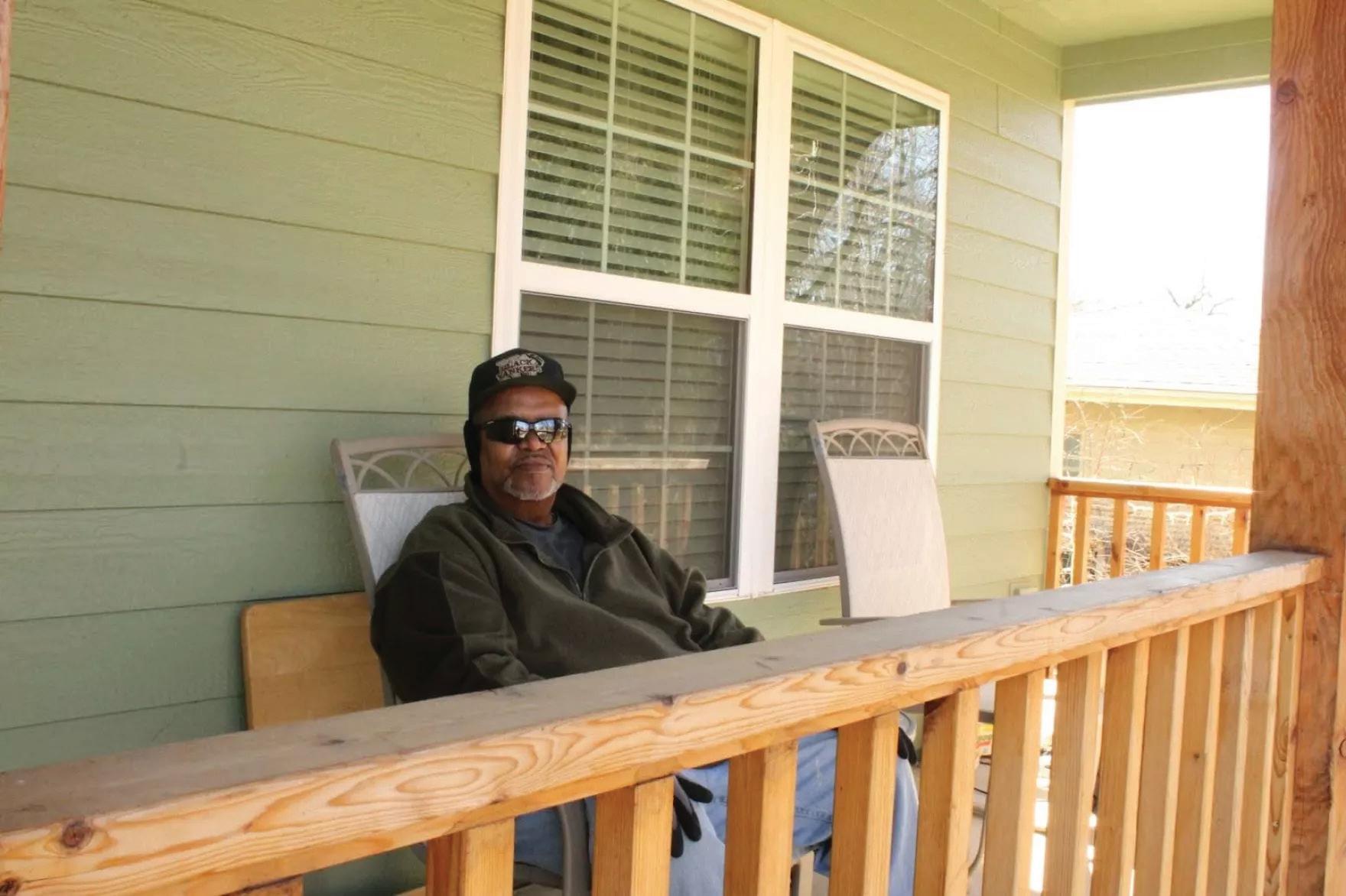
Feilmeier began brainstorming a solution. He has connections with many high net-worth families in Wichita, but he worried they wouldn’t be enthused at the prospect of simply giving away large sums of money to affordable housing construction. Instead, he raised $10 million from individual donors and local banks for a fund that would offer a return on investment.
The fund works like this: The money Feilmeier raised is loaned to nonprofits like Harding’s HOPE at a 5% interest rate — lower than most banks offer.
“Without him, I’d probably be at some other bank trying to get 8%, 7%, you know,” Harding said. “But yet he gives it at 5%.”
The nonprofits pay the loans down using rental income or mortgage payments. The investors themselves get their money back, plus 5%.
Meanwhile, Feilmeier said his family office is covering the cost of administering the fund at about $200,000 a year. That philanthropy allows his interest rates to stay low, he said.
Local banks chip in Feilmeier said local banks are interested in investing in Wichita Affordable Housing because the federal government encourages lending to low- to moderateincome neighborhoods. Regulators even evaluate banks to ensure they’re fairly providing loans.
“The problem is, when there’s nobody developing the houses, there’s no demand from the banks for their mortgages,” Feilmeier said. “And so the

“I went from one door to 15 doors in three years because of Steve’s help and his team,” Harding said. “I praise God that I have such a team.”
Harding points to planning documents for one of the homes he will be working on.
regulators are looking at these banks saying, ‘You’re not doing your job, so you have to do more.’”
Feilmeier said that encouraged local banks to invest in his social impact fund for affordable housing –even when they may not make as much money.
Aaron Bastian is president and CEO of Fidelity Bank, which invested $1 million into the fund over a 20year period. He described the move as a “hybrid” of investment and philanthropy.
“It is a loan, truly a loan, but it is at a below-market rate,” Bastian said. “And so it’s kind of a mix of lending and philanthropy because we’re giving up additional return. If I made that loan to one of our business customers, it would be at a higher rate.”
Public housing
Feilmeier’s efforts coincided with the city’s move to sell off its singlefamily public housing stock because many of the units need rehabilitation.
“It was fortuitous,” Feilmeier said. “… Here I retire at age 63 and after 75 years, the federal government finally decides to get out of the housing program.”
This winter, Habitat for Humanity purchased 16 former public housing units in northeast Wichita, which will be renovated and sold to low-income homeowners. Feilmeier’s fund loaned them low-interest dollars that helped them buy the homes.
Wichita made a second batch of homes available in January. Habitat bid on about 13, as did HOPE, Feilmeier said. Harding said he and Feilmeier are also working on a duplex.
The homes Harding is working on will likely start out as rentals to people who receive government rental assistance, called housing vouchers. Feilmeier was initially nervous about building rentals that would rely on vouchers to pay rent because the federal government gives out a very limited number.
“I quickly learned from the city, it’s like, ‘No, there’ll be no new vouchers.’ I’m like, ‘Well, don’t you think I’m taking a big risk if I go build new inventory?’” Feilmeier said. “And they’re like, ‘No, no, no, no, no. … Of the 3,000 vouchers that the city administers, they would say maybe a thousand of those people are in not great places.”
Still, Feilmeier wants to scale up, build more — maybe 200 to 300 homes if he can raise the money. But to do so, he needs people to lend to.
“I need more developers. I need more Kevasses and Habitats,” Feilmeier said. “You just have to do it with people that want to do it nicely versus, ‘I want to maximize my margin as a slumlord.’”
Reprinted with permission from KMUW.
Find more coverage of housing issues by members of the Wichita Journalism Collaborative by visiting wichitajournalism.org. The collaborative will hold a capstone event to celebrate its housing series, "Priced Out," on Sept . 5 at the Advanced Leraning Library. More details will be available in coming issues of The Active Age.
























Win tickets to the National Baseball Congress tournament!
The Active Age is giving away a dozen pairs of tickets to this year National Baseball World Series July 24-Aug. 2. The tickets are general admission single-day tickets. To enter our drawing for a pair of tickets, visit
theactiveage.com and fill out the form on our home page. You can also fill out the form below and mail it to: The Active Age, 125 S. West St., Suite 105, Wichita, KS, 67213.


Please enter me in a drawing for a pair of tickets to the NBC World Series.
Name:
Address: Telephone number: Email address:





We thought we were just getting a beautiful apartment—but what we really found was a vibrant, welcoming community. From art classes and wine tastings to concerts and game nights, life at Larksfield has offered so much more than we ever expected.”
— Denny B., Resident, Council Member and future Larksfield Landing Resident
Tuesday, July 8, 11:30 a.m
Larksfield Place • 7373 E 29th St N, Wichita, KS 67226
Larksfield Place is nearly full, but Larksfield Landing is just beginning! Join us for lunch, meet our team, and discover how Larksfield Landing offers the perfect opportunity to plan ahead. Learn about exclusive Charter Member benefits and limited-time pre-construction price breaks.
Friday, July 18, 2:00 p.m.
Explore the benefits of Life Plan Communities, the difference between non-profit and for-profit models, and enjoy favorite desserts from La Galette Bakery.

To RSVP, scan the QR code or call 316-202-4074. Stay informed about upcoming events and expansion updates.
Library book sale July 12
Get great deals on books, CDs, DVDs and more at the Friends of the Wichita Public Library sale from 10 a.m. to 2 p.m. Saturday, July 12. FWPL members can attend a preview sale from 5-6:30 p.m. Friday, July 11. Both will be held at the Advanced Learning Library, 711 W. 2nd St. More information is available at wichitalibraryfriends.org.
Master Gardeners sought Sedgwick County Extension Master Gardeners will hold an informational meeting from 2-4 p.m. Thursday, July 17 for people interested in joining them. Volunteers contributed over 28,000 hours


improving the community through gardening last year. The meeting will be held in the Extension Center 4-H Hall, 7001 W. 21st St. Scam workshops set
AARP will present “Fraud Basics: The Scam Landscape” at four locations over the next four months. The one-hour program will be held at 1 p.m. Wednesday, July 16 at the Wichita Public Library’s Evergreen branch, 2601 N. Arkansas; 10: 30 a.m. Monday, Aug. 25 at La Familia Senior Community Center, 841 W. 21st St. N.; 12:30 p.m. Thursday, Sept. 11 at the Advanced Learning Library, 211 W. 2nd St.; and 1 p.m. Tuesday, Oct. 21 at the Sedgwick County Extension Arboretum, 7001 W. 21st St.





for more than 7
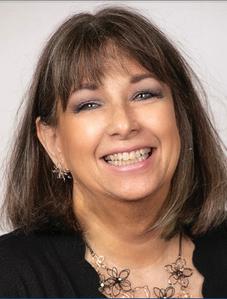

If you didn’t already consider Kansas a birder’s paradise, a new book will clear up that misconception.
“The Guide to Kansas Birds and Birding Hotspots” by Pete Janzen and Bob Gress is a comprehensive guide to the state’s feathered flocks — and a how-to for getting to know them. It’s just been published by the University of Kansas Press in a beautiful trade paperback format complete with 576 color photographs.
Gress is the former director of the Great Plains Nature Center in Wichita and a skilled photographer. Janzen is active in the Wichita Audubon Society and, like Gress, has written extensively on birds.
The new book is actually the second edition of a volume they first published in 2008. As well-known wildlife author Kenn Kaufman writes
in this edition’s foreword, “Every bird book needs to be updated occasionally, simply because the status of species changes over time.” The updates in this edition go much further, Kaufman noted: “This edition covers more bird species, brings all the information upto-date, includes far more photos, and describes almost four times as many hotspots as the previous version.”
Janzen and Gress report that an "amazing” 482 species of birds have been seen within Kansas’ borders, ranking it among the top 15 states in numbers of birds observed at least once.
“For an agricultural state in the Great Plains, this is an impressive ranking in comparison to other highranking states, all of which benefit from some combination of ocean coasts, mountain ranges, southwestern



desserts, and mild southern climates,” they write.
The reason for that “exceptional diversity,” they say, “is due in large part to the state’s location in the center of the continent.” As a result, birds from both coasts, Canada and the desert Southwest make their way here.
The book profiles 326 species most commonly found in the state. It’s written for beginning and intermediate birders and starts with a section on binoculars, bird identification techniques and other important basics. It includes a calendar of bird activity that explains when certain birds are likely to be found here.
The bulk of the book sorts the birds into species, from waterfowl and other swimming birds to wading birds and shorebirds, doves, owls, aerialists, insect catchers, songbirds, warblers,


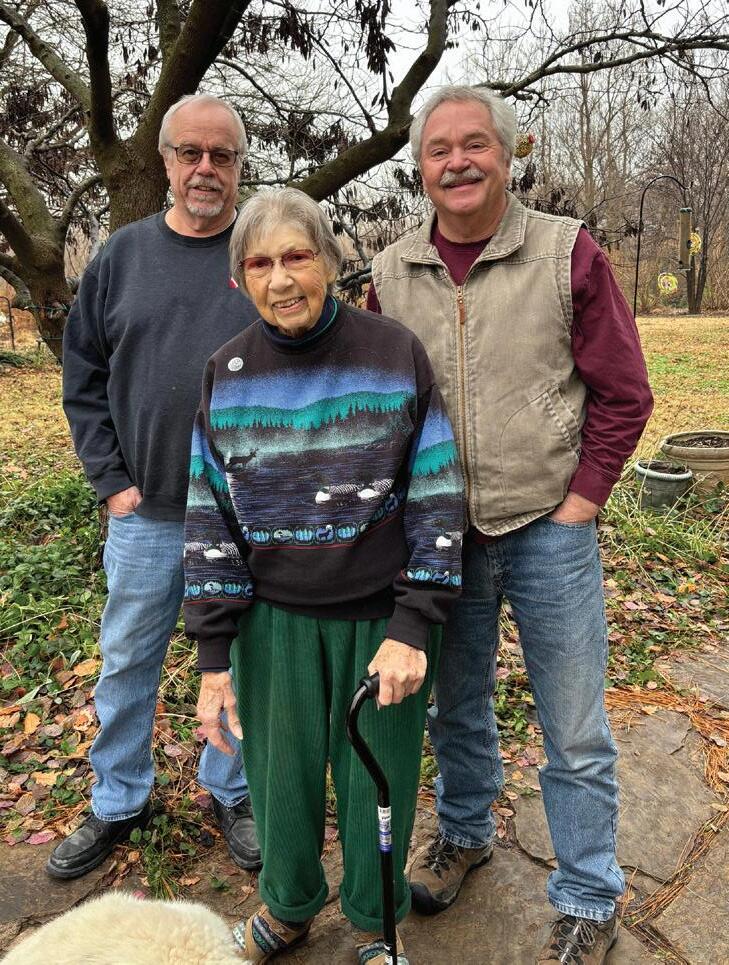









"Kansas Birds" features 576 color photographs of birds that have been spotted
Red-headed Woodpecker and Indigo Bunting.
thrushes and more. But almost as much space is given to a look at 100 birding hotspots around the state, from well-known locations such as the Cheyenne Bottoms and Quivira National Wildlife Refuge to urban oases such as Chisholm Creek Park and Great Plains Nature Center in Wichita. Over 200 species of birds have been found in the latter, the book notes, with its dogwood thickets particularly attracting migratory

warblers and songbirds in the fall.
“Kansas Birds” can be ordered on the University of Kansas Press webiste for $34.99 and should be available in local bookstores this month. Pete Janzen and Bob Gress will sign books at Faith and Life Bookstore in Newton on Aug. 9 and present a program for the Bethel College Life Enrichment program on Sept. 24.

Many people become fascinated by birds they've seen in their backyard, a local park or other location. Do you have a favorite story about a bird or birds you've seen? If so, share it with other readers of The Active Age by emailing joe@theactiveage.com, or mailing to The Active Age, 125 S. West St., Suite 105, Wichita, KS, 67213.



A day at the Zoo is more than just a visit. It’s an adventure filled with wonder, laughter, and unforgettable moments with loved ones. Live the Wild Life with us at the Sedgwick County Zoo.
Plan your adventure today!
By Jim Miller
Dear Savvy Senior, What kinds of legal documents do I need to help my family take care of me in my elder years? I would like to get my affairs in order but could use some help. Approaching 80
Dear Approaching,
All adults, especially an older adult like yourself, should have at least five legal documents to protect yourself and your family. These documents will make sure your wishes regarding your estate are legal and clear and will help minimize any conflicts and confusion with your family and your health care providers if you become seriously ill or when you die. Here are the key documents you need, along with some tips to help you create them.
Durable Power of Attorney: This document allows you to designate someone you trust to handle your financial affairs if you become incapacitated.
Advance Directive: This includes two documents that spell out your wishes regarding your end-of-life medical treatment. The two documents are a “living will” which tells your doctor what kind of care you want to receive if you become incapacitated. And a “health care power of attorney” (or health care proxy), which names a person you authorize to make medical decisions on your behalf if you’re unable.
To complement your advance directive, you should also consider getting a Physician Orders for LifeSustaining Treatment — see POLST. org. This is a state-specific form that your doctor would fill out that translates your end-of-life wishes into medical orders to ensure your wishes are carried out.
A Will: This lets you spell out your wishes of how you’d like your property and assets distributed after you die, whether it’s to family, friends or a charity. It also allows you to designate an executor to ensure your wishes are carried out and allows you to name guardians if you have dependent children.
In addition to a will, if you own real estate or have considerable assets, another option you may want to consider is a “revocable living trust.” This functions like a will but allows your estate to avoid the time and expense of probate (the public legal process that examines your estate after you die) and helps ensure your estate’s privacy.
HIPPA Release: This form gives your healthcare provider permission to


discuss your medical care and medical bills with those you designate. You may need specific HIPAA release forms for each medical professional or health care establishment you deal with.
Do-It-Yourself
If you have a simple estate and an uncomplicated family situation, there are do-it-yourself resources that can help you create all these documents for a few hundred dollars. Some toprated options to consider include Quicken WillMaker & Trust software (see WillMaker.com), Trust & Will (TrustandWill.com) and Legal Zoom (LegalZoom.com).
If, however, you want or need assistance or if you have a complicated financial situation, blended family or have considerable assets, you should hire an attorney. An experienced lawyer can make sure you cover all your bases — especially when writing a will or living trust — which can help avoid family confusion and squabbles after you’re gone.
Costs will vary depending on where you reside, but you can expect to pay somewhere between $500 and $2,000 for a basic estate plan that includes a will, power of attorney and advance directive. If you want your estate plan to include a living trust, that can run anywhere between $1,500 and $5,000.
The National Academy of Elder Law Attorneys (NAELA.org) and the National Association of Estate Planners and Councils (NAEPC. org) are two good resources that have directories on their websites to help you find someone in your area.
If money is tight, check with your state’s bar association (see FindLegalHelp.org) to find low-cost legal help in your area. Or call the Eldercare Locater at 800-677-1116 for a referral.
Dear Savvy Senior,
Does Medicare cover annual physical exams? I’ve gotten a physical every year since I turned 50 and would like to find out what Medicare covers when I sign up in a few months.
Almost 65

Dear Almost, No, Medicare does not pay for annual physical exams, but it does cover a one-time “Welcome to Medicare” checkup during your first year after enrolling in Part B. And after that, it covers annual wellness visits to keep track of your health. Here’s what you should know.
Physical vs Wellness Exam
In an annual physical, a doctor examines you, may do bloodwork and other tests and looks for problems even though you don’t have a specific complaint or risk.
The Welcome to Medicare checkup and annual wellness visits are different. They focus primarily on preventive care.
Your doctor will review your risk factors, develop a personalized health plan for you, check that you’re up to date with preventive tests such as cancer screenings and flu shots and may refer you for other tests. Here’s a breakdown of what these exams may include.
Welcome to Medicare Checkup
This is an introduction to Medicare and focuses on health promotion, disease prevention and detection to help you stay well. It’s an opportunity for your doctor to assess your health and provide a plan for care. During this visit your doctor will:
• Take your height, weight and blood-pressure measurements, and calculate your body mass index (BMI).
• Ask about your personal and family health history.
• Give you referrals for other care as needed.
• Assess your potential for depression.
• Provide a simple vision test.
• Recommend vaccines, tests, screenings and other preventive services you need to stay healthy
• Offer to talk with you about creating advance directives.
This visit includes some of the same elements as the Welcome to Medicare checkup. For example, your
doctor will review your medical history, record your vital information and give you an opportunity to talk about advance directives. Your doctor may also provide the following services:
• Create a screening checklist for recommended preventive services for the upcoming year.
• Look at health risks and treatment options.
• Perform a cognitive assessment to look for signs of dementia.
• Provide personalized health advice.
• Review your current prescriptions.
• Study risk factors for opioid problems if you have a prescription for opioids, and screen for potential substance-use disorders
The Welcome to Medicare and annual wellness visits are fully covered by Medicare Part B without any outof-pocket costs. You don’t need the Welcome to Medicare visit to qualify for later annual wellness visits, but know that Medicare won’t pay for a wellness visit during the first 12 months you have Part B.
During these visits, the provider may order additional tests or procedures that may be subject to Medicare’s deductibles, copayments or coinsurance.
Make sure that when you book your appointment, you specifically ask for the Welcome to Medicare checkup or annual wellness visit to ensure Medicare covers it. Otherwise, you may have to pay for the visit.
If you’re enrolled in Medicare Advantage, you’ll probably need to use an in-network provider for the wellness visits to be covered. Some Medicare Advantage plans also cover annual physicals in addition to the wellness visit. Check your plan for details.
Send your questions or comments to questions@savvysenior.org, or to Savvy Senior, P.O. Box 5443, Norman, OK 73070.
For more Savvy Senior tips, visit theactiveage.com. Topics for March include:
• Gravesite Care When You Can’t Get There
• What Is a Spousal IRA?
By Joe Norris
My great-great grandfather was a frugal man by necessity. He had no money and even less luck. His parents named him James Philip Norris, but he soon lost the “James” entirely. As a working farmer with a family, Philip Norris was already carrying enough of a load. He had no interest in lugging around an extra name.
In 1857, he was scratching out a living in Kentucky when his wife Mary Ellen suddenly died at age 31, leaving him with six young children. Philip couldn’t afford the luxury of an extended grief period. So after only 43 days, he married his second cousin Mariah Norris. The toddlers already knew her, and marrying someone with the same initials as his first wife meant Philip wouldn’t have to waste money on new monogramming.
After the war, Philip and Mariah decided to move the entire family to California. They made it as far as Tonganoxie, Kansas, where tragedy struck again. The family got stranded by a Kansas blizzard, and were forced to take shelter until spring. But Mariah passed away before the warm weather arrived, and Philip’s dreams of California died there, too.
Public records show Philip’s place of residence changing multiple times after that. But he was always categorized a “widower” and “farmer.” He died in 1883 in Neosho County in southeast Kansas, and was buried in Ladore Cemetery. My wife and I decided to take a day trip and find his grave.
We couldn’t find a town called “Ladore” anywhere on the Kansas map. As we dug deeper, the reason became obvious. Ladore was founded in 1867 and became a boom town overnight, but vanished just as quickly. The rapid rise and fall were both tied to the railroad.
In the late 1860s, it was rumored that the Missouri, Kansas & Texas Railway — known as the Katy — planned to build a major rail hub somewhere in Southeast Kansas. Nobody knew exactly where. But a few speculators thought they did. So they started buying up land in Neosho County, on the banks of the Labette Creek.

An innkeeper named James Roach constructed the first building. A post office, a church and a general store soon followed. When the Katy Railway started building a junction of two lines near the handful of stores, the town’s population exploded. What had been just a bare patch of land a few months earlier was now a town with a thousand citizens. They called it Ladore.
The town soon had schools, saloons, hotels, restaurants and pretty much everything else a thriving town needed. Everything, that is, except for law enforcement. The first railroad track came to Ladore in May 1870, bringing a flood of immigrants and settlers. But it also brought grifters, con men and thieves. Crime began to spread. Public drunkenness was on daily display. Citizens were held up at gunpoint on Main Street in broad daylight.
An 'outrage' and a lynching
On May 10, 1870, the situation got much worse. Seven desperados rode into Ladore looking for trouble. They drank up most of the whiskey in town, then began beating local citizens and taking their possessions. At around 7 p.m., the gang went to James Roach’s inn and demanded rooms for the night. Roach refused them because they were drunk. So they beat him unconscious with their revolvers, then grabbed the inn’s two teenage chambermaids and dragged them off into the woods. There, as one newspaper later reported, the outlaws “committed a frightful outrage against the two girls.”
One of the girls got away during the night and ran back into town. By first light, a posse of 300 local men had captured six hungover desperados. The seventh suspect had been killed during the night in an internal gang dispute. Five of the remaining six outlaws were positively identified by the two girls as the offenders. They couldn’t identify the sixth man, so he was released into the custody of the citizens he had robbed the day before. Exactly how the angry mob dealt with him is unknown. But his five outlaw friends all met their ends before sundown. They were all
hanged from the same branch of a big hackberry tree, less than 24 hours after their crime.
The lynching made newspaper headlines from as far away as London. Ladore was labeled “the meanest town in Kansas.” Maybe it was the bad publicity that killed Ladore’s future. Maybe it was the way Ladore landowners had inflated their prices, hoping to make a fortune selling real estate to the railroad. Or maybe it was because another small community in that corner of Kansas promised to name their town after Levi Parsons, president of the Katy Railroad.
Town moves on
We may never know. But just a few weeks after the lurid headlines, Katy began building their big rail hub in the newly-named town of Parsons, just five miles south of Ladore. The grand new Parsons station was completed a year after the lynching.
This abrupt turn of events might have spelled financial ruin for a less resilient group of merchants. But the speculators in Ladore treated the situation as no more than a temporary setback. If the railroad wouldn’t come to their town, they’d take their town to the railroad. Merchants jacked up their saloons and hardware stores, put them on skids, and moved them five miles south to Parsons. The boomtown of Ladore quickly became a ghost town.
We learned all of this before heading to Neosho County to look for my great-great grandfather’s grave. But it still took us awhile to find the Ladore Cemetery. It’s out in the middle of a section of wheat fields at the dead end of a dirt road. The cemetery is the only remaining evidence that a thriving town once stood here. There are no abandoned buildings, no crumbling foundations, no signs of civilization at all. Just a good-sized graveyard that is surprisingly well-tended.
Finding great-great grandpa
We searched among the old gravestones for over an hour with no success. Finally, my wife yelled “Found him!” from halfway across the cemetery. I could see that she was staring down at the ground as she called out. Great-great Grandpa Philip’s stone marker had snapped off at the base
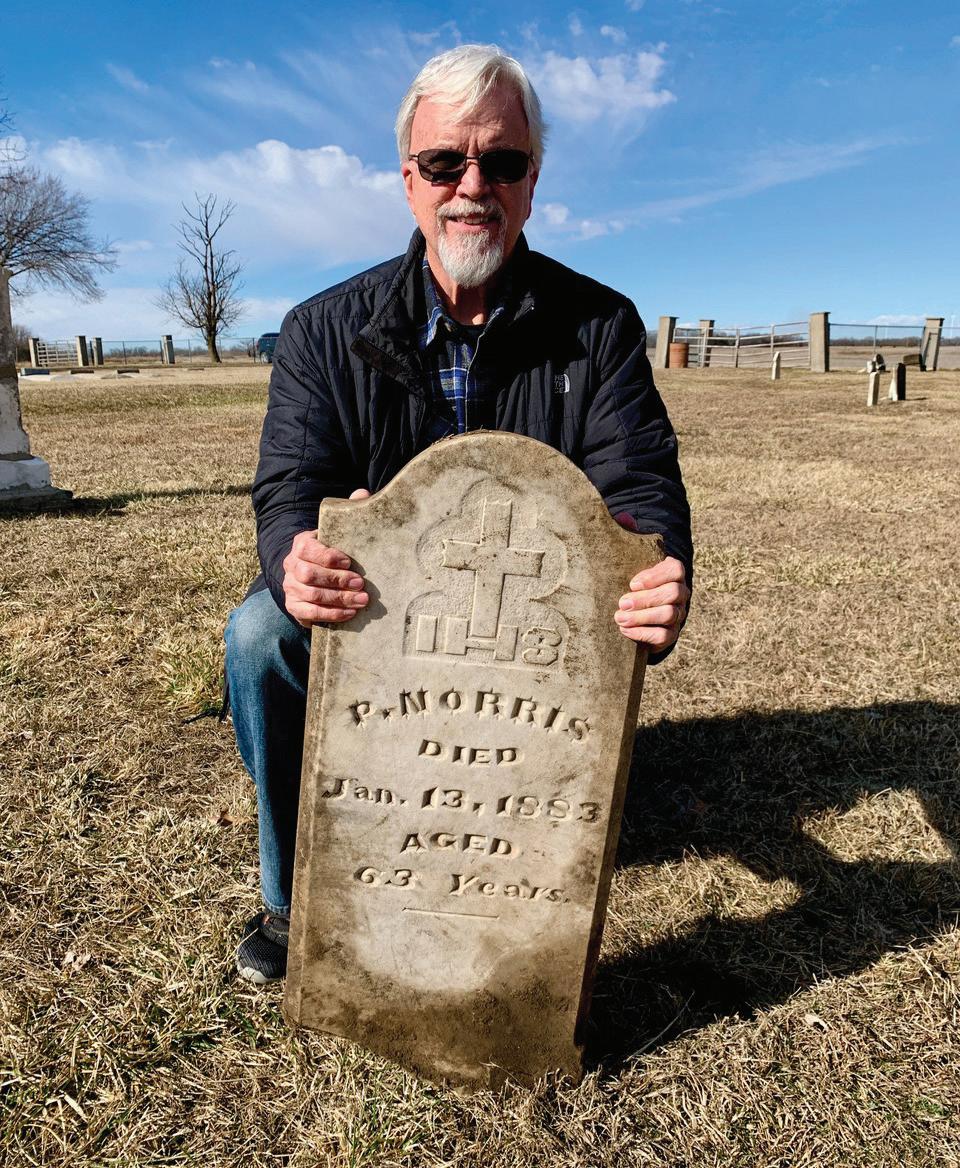
and had toppled over onto its back. The headstone was almost completely buried beneath decades of dirt and buffalo grass.
We pried the headstone up out of the ground and dusted it off. The name and the dates were all correct. This was, in fact, my great-great grandfather’s final resting place. I could see that someone had attempted to set his gravestone back upright again with some construction adhesive. But it hadn’t worked. So we headed back home to get some steel posts and masonry screws to make a more permanent fix. It wasn’t the prettiest repair job that’s ever been done in a ghost town cemetery. But it was the kind of practical, no-frills solution that a guy like Philip would have appreciated. And his face was back in the sunlight again.
By the time Philip died in 1883, the town of Ladore would already have been pretty much gone. But I suspect that’s the very reason why he’s buried here, in such an obscure place. There’s not a lot of demand for burials in a ghost town, so the plots would’ve been cheap. And great-great Grandpa Philip was always a frugal man. That probably also explains the inscription on his tombstone. Instead of “Philip Norris”, the stone identifies him simply as “P. Norris.” The stone carver probably charged by the letter.
Joe Norris is a writer and former Wichita marketing executive. He can be reached at joe.norris47@gmail.com

BEL AIRE
7651 E Central Park Ave 744-2700, ext 304 www.belaireks.org
BENTLEY/EAGLE 504 W Sterling, 796-0027
CHENEY 516 Main, 542-3721
CLEARWATER 921 E Janet, 584-2332
DERBY 611 N Mulberry Rd, 788-0223 www.derbyks.com
DOWNTOWN 200 S Walnut, 267-0197 www.seniorservicesofwichita.org
EDGEMOOR 5815 E 9th, 688-9392
ANDOVER
GARDEN PLAIN 1006 N Main, 535-1155
GODDARD 122 N Main, 785-398-1255
HAYSVILLE 160 E Karla, 529-5903
KECHI Kechi City Building, 744-0217, 744-1271
LA FAMILIA 841 W 21st, 267-1700
LINWOOD 1901 S Kansas, 263-3703
MCADAMS GOLDEN AGE 1329 E 16th, 337-9222
MT HOPE 105 S Ohio, 667-8956
MULVANE 632 E Mulvane, 777-4813
NORTHEAST 2121 E 21st, 269-4444
OAKLAWN 2937 Oaklawn Dr, 524-7545
ORCHARD PARK 4808 W 9th, 942-2293
PARK CITY 6100 N Hydraulic, 744-1199
VALLY CENTER COMMUNITY CENTER 314 E Clay, 755-7350
410 Lioba Dr, 733-4441 www.andoverks.com
AUGUSTA 640 Osage, 775-1189
BENTON Lion’s Community Bldg, S Main St CASSODAY Cassoday Senior Center 133 S. Washington, 620-735-4538
July 2
10:30 am Wichita Art Museum 1400 W. Museum Blvd., $2 admission. Info not available 1:30 pm Museum of World Treasures 835 E. 1st St. The Military Decades in Africa: War and Gender in Twentieth Century Nigeria.
July 9
10 am Sedgwick County Zoo, 5555 Zoo Blvd. (316) 266-8213, $4 Hey Honey! What’s the Buzz? 1:30 pm Advanced Learning Library, 711 W, 2nd, (316) 261-8500, Free. Film-Making with Fritz Robinson.
July 16
10 am Ulrich Museum of Art, 1845 Fairmount St. The Printmaking Process
Derby Sr Center, 611 Mulberry. 3rd Tuesday 7pm-9:30 pm. El Dorado Jam & Dance, Senior Center, 210 E. 2nd.
DOUGLASS 124 W 4th, 746-3227
EL DORADO 210 E 2nd, 321-0142
LEON 112 S Main, 745-9200 or 742-9905
ROSE HILL 207 E Silknitter, 776-0170
with Doug Billings. 1:30 pm Great Plains Nature Center, 6232 E 29th St N. Info not available.
July 23
10 am Wichita-Sedgwick County Historical Museum, 204 S. Main. Thanks! It’s Thrifted!
1:30 pm Mid American All-Indian museum. 650 N Seneca (316) 3503340, $2 + tax admission; free for MAAIM members. Info not available.
July 30
10am The Kansas African American Museum, 601 N Water. $3. Info unavailable. 1:30 pm Old Cowtown Museum. 1865 Museum Blvd $2 + tax; bers. Info unavailable
Prairie Wind Dancers: Plymouth Congregational Church, 202 N Clifton. Joyce, 683-1122.
Linwood Golden Age, 1901 S Kansas. Every Saturday 7pm-9:30pm. Call Jim 316-945-9451 Minisa Golden Age, 704 W 13th. Info 617-2560. Every Thursday 7pm9:30pm. Call Rita 316-364-1702 Oaklawn Activity Center, 4904 S. Clifton. Contra Dance1st Saturday of each month. 7pm-9pm. Call Amanda at 316-361-6863. Orchard Park Golden Age, 4808 W 9th. Every Friday 7pm-9:30pm. Call Casey 316-706-7464
Village Steppers Square Dance, Oaklawn Activity Center, 4904 S Clifton. 2nd and 4th Saturday of each month September through May 7:30 - 10:00 pm. Info: Mike Huddleson 316-650-2469 Westside Steppers Square Dance, 1st and 3rd Sunday of each month, 6-8:30 p.m., West Heights United Methodist (entrance "D"), 745 N. Westlink Ave. Info: Sheldon Lawrence (316) 648-7590.
Aging Projects serves a hot, nutritious meal weekdays for persons 60 and older in Sedgwick, Harvey and Butler counties. Reservations are necessary. For locations and reservations, call 316-686-0074
WEEK OF JULY 1
Tue: South Haven Hashbrown egg bake, green beans, pears, biscuit.
Wed: Cowboy Beans, harvest beets, mandarin oranges, corn bread/muffin.
Thu: Salisbury Steak, mashed potatoes w/ gravy, carrots, peaches. Fri: HOLIDAY.
WEEK OF JULY 7
Mon: Pulled pork sandwich on bun, garden salad, baked beans, applesauce.
Tue: Chicken fried steak, mashed potatoes, creamy gravy, carrots, banana.
Wed: Fish filet, brown rice, green beans, apricot.
Thu: BBQ beef w/ homemade sauce, baked sweet potatoes and apples, fresh orange.
Fri: Egg salad on bun, potato chips, peas, peaches.
WEEK OF JULY 14
TOWANDA 317 Main, 316-536-8999
Open 10:30 am-5 pm Mon, Wed, Fri
WHITEWATER Legion Hall, 108 E Topeka
BURRTON 124 N Burrton, 620-463-3225
HALSTEAD 523 Poplar, 835-2283
HESSTON
Randall & Main, 620-327-5099 www.hesstonseniorcenter.com
NEWTON AREA SENIOR CENTER 122 E 6th, Newton, 283-2222 www.newtonseniorcenter.com
SEDGWICK 107 W. Fifth, 772-0393
Sedgwick Co Transportation, 660-5150 or 1-800-367-7298. Information: 8 am-5 pm, Mon-Fri; closed most holidays. www. sedgwickcounty.org/aging.
Weekday transportation in El Dorado, Augusta and Andover. Rides to Wichita on Wed, Thu. Information: Augusta, 775-0500; El Dorado, 322-4321; toll free, 1-800-2793655. 48-hr notice required.
Transportation reservations or information: 316-284-6802 or 1-866-6806802. Round-trip: $8 Newton (wheelchair only), $12 Harvey County, $20 outside Harvey County. AVI to Newton: Tue, 12:304:30 pm from Burrton, Sedgwick, Halstead, Hesston, Walton.
Mon: Taco Burger on bun, refried beans, peach crisp .
Tue: Chicken & pasta salad, bean salad, salad crackers, pears.
Wed: Swedish steak, rice, chilled tomatoes, applesauce
Thu: Baked chicken, mashed potatoes, creamed gravy, carrots, mixed fruit, carrot cake.
Fri: Open-faced pork w/ cream gravy biscuit, mixed vegetables, ambrosia fruit salad.
WEEK OF JULY 21
Mon: Chicken chef salad, salad crackers, pears.
Tue: Cheeseburger casserole, creamed peas, banana.
Wed: Tuna Salad sandwich on bun, macaroni salad, carrots, peaches
Thu: Madison Pizza, roasted zucchini, pineapples.
Fri: Oven fried fish w/ tartar sauce, coleslaw, orange, cornbread muffin.
WEEK OF JULY 28
Mon: Sysco little smokies w/ BBQ sauce, mac n cheese, broccoli, watermelon, wheat roll.
Tue: Tuna pasta salad, cottage cheese salad, applesauce, pickledbeets, crackers. Wed: Ham & broccoli casserole on biscuit, corn , peaches
Thu: Cranberry meatballs, potatoes, mixed vegetables, cantaloupe .
* Milk or grape juice is served with all meals. Meals fall within the following ranges: Calories 650-750; protein 25 grams or higher; fat 20 to 30 percent of calories; calcium 400 mg or higher; sodium 1,000 grams or less; fiber 9 grams or higher.
FUNDING MADE POSSIBLE THROUGH THE OLDER
Resthaven, 2 side by side plots Located in Garden of the Cross. $4000 each seller pays transfer fee. 316-734-3292
2 lots at Resthaven & Gardens of Memory, Sermon on the Mount, lot 123d, spaces 3&4. $10,900 for both. 817-905-2277- Pete Thomas
Two plots at Resthaven, Garden of the Cross, valued at $11,000 asking $7,000 OBO for both.Seller pays transfer fee. 316-993-6105
White chaple memorial gardens. Sermon on the mount. 2 lots w/ 2 top seal vaults. Asking $8,000 OBO. Seller pays transfer fee. 913-515-5688.
Old mission cemetery at Hillside and 21st. One crypt in Mausoleum. Opening/closing negotiable. Call 316-253-9905.
Resthaven, 2 lots section 12 lot 34B spaces 3&4. 2 vaults, bronze plate and 2 concrete underground vaults. $14,500. Call 720-291-2545.
White Chapel Masonic Garden
Two plots side by side. Two vaults. One opening/closing.
1 Bronze Memorial 24x12
1 Granite Memorial 62x16
Valued $12,500, Selling $10,000 obo. (316)250-8641
Double depth plot wth vault in Garden of Gospel Resthaven in Wichita,KS. $9000.00 OBO Call (316)409-4012, leave message.
1 niche available Wichita Park/Old Mission. Northeast Gallery level 2, Row F Mission Chapel niche east. Value is $6,849, sell for $2,500. Seller pays transfer fees. 316-652-9943
Two adjacent cemetery plots, White Chapel Memorial Gardens. For additional information contact 316-734-2912
Lakeview Cemetery, True companion crypt, hold 2 caskets, $13,500. Ron 316-554-1001.
Single Plot – Resthaven Cemetery – Garden of the Cross 46A1 $5000 OBO Email: arkpegram@cox.net OR 479-644-6680 Serious inquires only
12 Family Plots in the Family Estate Section, Lot 4, Resthaven $30,000. 316-648-6034
2 plots in Resthaven in Last supper, Lot 49 spaces B1&2. $5,500/both. Individual price $3,000. Buyer pays transfer fee. Call 316-644-4106.
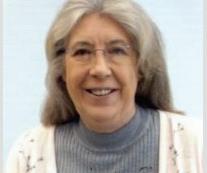

Alpha Electric Dependable Electrical Service Call Greg at 316-312-1575 Insured, Lic. #1303
Cheryl Rosine ~ The Foot Lady ICMT RN
$40 : In-home, Sedgwick & surrounding counties • 316-312-2025 • Benjamin Jones ~ CNAICR • 316-932-8524•
Diabetic, thick toe nails, ingrown & callous care
Private Duty Aide with light house keeping. Availability evenings and weekends. References upon request. Cynthia CNA/HHA 316-992-6711
Caregiver 50 yrs experience with refrences Hours and Days negotiable Call Kathy 316-516-2149
Caregivers for Elderly. Personal care assistance, bathing, meals, light housekeeping. Full or part time. 316-390-9526
Personal care assistant needed. Bathing and Dressing. Primarily in the morning. Professional mature individual. Call 316-519-1627
Weekend Care 24/7 by CNA From Friday-Monday
Experienced w/Dementia+ALZ, companion care, transportation to and from appointments, light cleaning. References available. Wichita, Ks, Oklahoma and surrounding area Cristi 539-900-3695 LEGACY HOME HEALTH 316-755-8785
Providing in home skilled care when ordered by your Doctor or Nurse Practitioner. Specializing in Memory Care with Speech Therapy who can take the frustration out of communication challenges!

Discount. 316-312-2177
Molina Electric - Wichita Lic #1364 Comm. or Residential wiring. Service calls. New electric service. Troubleshooting. Cell 316-461-2199.
Handyman RX- We have a remedy for almost all of your “fix-it” jobs! Light carpentry including deck and fence repair, indoor misc. repairs and installations, lawn mowing “LG or SM”, Yard & Garage clean-up, mulching, hauling miscellaneous,hauling dirt, sand, and rock/gravel upto 3.5 tons. What you need done I can probably handle. Call for HELP! Brian 316-217-0882. Free Estimates
Cowboy Construction Remodeling, siding, decks, fences, windows, doors and more. 20 years locally owned. Free estimates. Senior discounts. Todd Wenzel 316-393-4488
Brush, Limbs, Debris, Hauling and Junk Removal. Leaf removal. Free scrap metal pickup. Free Estimates. Call David at 316-213-8880.
Chuck’s Flooring Carpet Installs Tile, Laminate re-stretching, repairs and more 316-553-6080






















Bruce’s Tree Service FIREWOOD Get an Early Start on your trimming for 2025
Complete Tree Trimming & Removal Gutter Cleaning and Leaf Rake Trees * Shrubs* Hedgerows * Evergreens Senior Discounts. Insured. Over 30 years exp. ALL FARM & RURAL AREAS Snow Removal Call 316-207-8047
Felipe Tree Service Evergreen trimming. Tree removal. Brush hauling. Splitting. Deadwooding. Free estimates. 12 years experience. 316-807-4419

It won’t be easy replacing Laurel Alkire, who’s retired after serving as executive director of Senior Services, Inc., for more than two decades. The nonprofit operates for Meals on Wheels, four senior centers and a senior employment program in Wichita.
“She’s been the face of seniors and services in this community,” said Donna Johnson, chair of the organization’s board of directors. “A really special person. My favorite thing about watching Laurel was her interaction with our clients. She just kind of lit up working with them and getting to know them.”
Alkire’s last day as executive director was May 30.
“It’s always been a struggle,” Alkire said of running a nonprofit. “There have been things we’ve wanted to do that we haven’t been able to do. But I think we serve a lot of people with the money we have.”
Senior Services, Inc., has begun a search for her replacement. The organization has 27 employees and hundreds of volunteers.
Alkire traces her career to the fact that she was close to her grandmother growing up. When Alkire’s mother discovered that she’d been adopted, Alkire got to know her biological grandmother as well.
“I was just always taking care of older people. I don’t know where that came from.”
She earned a master’s degree in aging studies for Wichita State University and was hired to run the senior employment program at Senior

Services in 1987. She left in 1990 to run the local Alzheimer’s Association chapter, then returned in 2002 to take over form Judy Finnell at Senior Services.
“Judy was a great boss, and she was also fun.”
Senior Service currently delivers Meals on Wheels to about 750 lower-income, homebound people each weekday. About 100 of the most vulnerable are also served on weekends.
It runs four senior centers — Downtown (200 S. Walnut), Linwood (1901 S. Kansas), Northeast (2121 E. 21st) and Orchard Park (4808 W. 9th). Its employment program placed about 1,000 people 55 and older in jobs last year.
The organization relies on a combination of funding from the federal government, Sedgwick County and private donations.
“It (funding) is pretty finite,” Alkire said. “What I’ve read is only one percent of all the grants and places that give out money go to seniors.”
At times, the waiting list for Meals on Wheels has numbered as many as 300 people. Alkire said the money Senior Services receives from Sedgwick County for its senior centers has remained stagnant for 30 years.
Several years ago, Senior Services started charging a $35 annual fee for senior center members, which Alkire conceded was “a hard sell”
“There was a lot of push-back but we said we can’t keep doing it (at no cost) forever.”
Exercise classes, ranging from chair yoga to fairly high-impact classes, are the centers’ most popular activities, but educational courses, crafts, field trips and many more activities are offered. (For a complete schedule, visit seniorservicesofwichita.org.)
Senior Services utilizes hundreds of vetted and trained volunteers to deliver Meals on Wheels. In addition to providing nutrition, the program ensures that recipients are seen by somebody every day.
Alkire said those recipients “are so connected to our wonderful volunteers. We know these volunteers go out of their way and do stuff for them.”
Senior Services moved to its current location — the former St. George Orthodox Church in Delano — in 1991, after the city booted it out of the Boathouse. In 2017-18, a $4 million renovation transformed the kitchen and added a second floor for offices.
“The new kitchen was the biggest thing,” Alkire said. “We were having to have product (for Meals on Wheels)
The Dog Aging Project is seeking healthy older dogs to participate in the Test of Rapamycin in Aging Dogs (TRIAD), a clinical trial that will assess the effects of rapamycin on canine health and aging.
According to a news release, this research builds on two previous studies that show evidence that small doses of this drug may help to mitigate or delay the diseases of aging.
The TRIAD clinical trial, which
will involve a total of 580 dogs, currently has more than 200 canines participating. More than 20 dogs have already completed the trial.
Dogs must be at least 7 years old, weigh between 44-120 pounds, have been spayed or neutered, and be in good health to participate. Prospective participants can learn more and determine if their dog may be eligible by completing an online questionnaire at https://dogagingproject.org/triad
If a dog is eligible, they will receive a cardiology or neurology screening exam as part of the study at the nearest clinical trial site, which is Overland Park, KS.
More trial sites will be added in the future. As part of the study, participants will need to take their dog to a designated site every six months for three years.
While TRIAD is designed to focus on canine health, the findings may
brought in every day” because of a lack of storage and prep space.
For years, Senior Services held an annual celebrity roast to raise money. Its biggest annual fundraiser now is Picklepalooza, a pickleball tournament held at Chicken N Pickle. Senior Services likely introduced pickleball to Wichita during the 1990s, although its popularity didn’t take off until later.
The various programs at Senior Services work together, Alkire said. For instance, the classes and other activities at the centers help keep people from needing Meals on Wheels. “That’s what keeps them going — and making friends” at the centers, Alkire said.
When people do begin receiving Meals on Wheels, that helps them to stay in their own homes longer. “We keep people at home — that’s where we all want to be — for as long as possible.”
Johnson said the board has served a search committee and will hopefully hire someone in the next few months.
“We have a really good leadership team in place We want to make a decision that’s a good one going in the future. We think there are probably a lot of good local people who may be interested” in the post.
Alkire said she will probably continue to stay involved with seniors in some way and may take a part-time job some day, but for now, she’s planning to work around the house and enjoy spending time with family and friends.
“In the summer, we’re at the lake a lot. We’re big lake people.”
also provide translational knowledge supporting human health.
“Dogs experience many of the age-related cognitive, sensory, neuropathologic and mobility changes that are common in older humans,” said Dr. May Reed, a geriatrician at the University of Washington School of Medicine and a primary investigator in the study. “
The Dog Aging Project is a community science initiative led by Texas A&M University, the University of Washington, and Tufts University.
By Jennifer Reyes
For many of us over 55, staying active and independent isn’t just a goal, it’s essential to our quality of life. Whether you’re recovering from knee surgery, managing arthritis or simply finding that balance isn’t what it used to be, you’re not alone. Millions of active adults discover that a mobility aid can be the key to maintaining the lifestyle they’ve worked hard to enjoy.
Wheeled walkers have become increasingly popular among active adults because they provide support without the stigma often associated with traditional walkers. However, with different types available, choosing the right one can feel overwhelming. Should you go with a basic rolling walker or invest in a rollator with all the bells and whistles?
Getting professional guidance
Before you start shopping for a wheeled walker, consider scheduling a consultation with a physical therapist or occupational therapist. Think of them as your personal mobility consultants. They can save you time, money and potential frustration by helping you choose the right device from the start. Many insurance plans cover these consultations, making this professional guidance both accessible and valuable.
During your evaluation, the therapist will consider factors that directly impact your daily life. He will assess your home environment. Can you navigate your hallways and doorways easily? Do you have stairs or thresholds to manage? He will also evaluate your strength, particularly your grip strength, which is important for operating features like hand brakes.
Your cognitive sharpness and safety awareness are also important factors. This isn’t about intelligence; it’s about ensuring you can operate your chosen device safely and remember to use features like brakes when needed. These comprehensive evaluations help ensure your walker enhances your independence rather than creating new challenges.
Rolling walker: The traditional choice
The rolling walker, also known as a standard wheeled walker, represents the more traditional approach to wheeled mobility assistance. These devices are characterized by a lightweight frame with front wheels that are typically fixed in position, creating a larger turning radius but providing stable forward motion.
Rolling walkers offer several practical advantages. Budgetconscious shoppers will appreciate their affordability, at $30 to $50, they won’t break the bank.
At just 7.5 pounds, rolling walkers are easy to lift into your car trunk or carry up a few steps when needed. Their compact design means they won’t dominate your living space or make your rooms feel cramped.
Most importantly, rolling walkers are designed for you to lean on them when needed. If you’re dealing with balance issues or leg weakness, this weight-bearing capability can provide the confidence you need to stay active. Both rolling walkers and rollators typically support up to 300 pounds.
The Trade-offs to Consider Rolling walkers do have limitations that might affect your
lifestyle. If you enjoy outdoor activities like walking in the park or have to navigate uneven sidewalks, the fixed front wheels can make these activities more challenging. The wheels don’t swivel, so making sharp turns requires more space and effort.
Without a built-in seat, you’ll need to plan your outings around available benches or chairs if you need to rest. Rolling walkers don’t come with builtin storage, but you can purchase walker bags or baskets separately to add convenient carrying capacity.
Rollator
Rollator walkers feature four wheels that can swivel, hand brakes, a built-in seat and often include storage compartments.
Rollators shine when it comes to maintaining an active, social lifestyle. The four swiveling wheels make them excellent for navigating crowded places like shopping malls, restaurants, and community centers. The built-in seat is often a game-changer for active adults. Whether you’re waiting in line at the grocery store, watching grandchildren at the park or taking a break during a longer walk, having a seat available means you can pace yourself and stay out longer.
The storage compartment beneath the seat is practical for everyday life. Some models include cup holders and additional storage pockets, making them ideal for social outings.
Hand brakes provide an added sense of security, especially if you live in an area with hills or ramps. You can control your speed going downhill and stop whenever needed.

Rollators require more from you as a user. The hand brakes, while helpful, need adequate grip strength to operate effectively. If you have arthritis in your hands or reduced grip strength, you might find the brakes difficult to use when you need them most.
At 11 to 14 pounds, rollators are significantly heavier than rolling walkers. They’re also bulkier, which could be problematic if you have a small car or limited storage space at home.
The higher cost, typically $75 to $110, might be a consideration if you’re on a tight budget
Making your choice
The right wheeled walker can be a game-changer for maintaining your independence and active lifestyle. Remember, this isn’t a permanent decision. Your needs may change over time, and what works for you now might not be what you need in six months or a year. The important thing is choosing a device that you’ll actually use and that helps you stay active and engaged in the activities you enjoy.
Jennifer Reyes is a physical therapist.
Rising food costs can make healthy eating a challenge for many families. In fact, a poll conducted by Research!America found about 60% of Americans cite the cost of healthy food as their single biggest barrier to achieving better nutrition.
“Food is deeply rooted to family and community,” said Arlen Vanessa Marin, M.S., R.D., a national volunteer for the American Heart Association. “Recipes are passed down through generations, but as grocery prices rise, finding creative ways to stretch your budget while maintaining a nutritious diet is key. Simple swaps — like homemade vinaigrettes instead of sugary bottled dressings, frozen veggies instead of fresh or lentils instead of processed meat — can make a big difference without sacrificing flavor.”
Consider these simple tips from
the experts at the American Heart Association, devoted to changing the future to a world of healthier lives for all, to help you enjoy your favorite meals while keeping both your heart and wallet happy.
Protein without the price tag
If you’re looking to add more protein without overspending, try these affordable, nutrient-packed options:
• Beans and other legumes are protein-packed, high-fiber choices for heart-healthy meals. Add them to soups, stews or salads, or enjoy them as dips with whole-grain crackers or tortillas. Choose canned, nosalt-added varieties for a quick and healthy option.
• Tofu and tempeh are versatile, plant-based staples that are rich in protein. Add silken tofu to miso soup, stir-fry firm tofu with garlic for a
heart-smart meal or add tempeh to noodle dishes and curries.
• Ground turkey or chicken are leaner, often more affordable alternatives to ground beef. For a budget-friendly twist, try them in dishes like turkey picadillo or homemade tacos.
Better grains for your heart
White rice is a staple in many diets, but it can spike blood sugar. When refrigerated and reheated, it can increase resistant starch while also raising the risk of harmful bacteria. Consider these ways to keep it heartsmart:
• Brown rice is a fiber-rich alternative to white rice that pairs well with almost any dish.
• Quinoa is another protein-rich grain that works in soups, salads and side dishes.
• Barley is used in many Asian soups as a whole-grain swap.
Canned, dried and frozen alternatives
Healthy eating doesn’t mean you have to buy everything fresh, especially when fresh food isn’t readily available. Canned, dried and frozen foods can be just as nutritious and help eliminate costly food waste from spoilage as they stay edible longer. Check nutrition labels for low-sodium, no-salt-added and no-sugar-added options.
• Frozen fruits and vegetables are picked at peak ripeness and frozen to lock in nutrients. Use them in stirfries, soups, smoothies or as quick side dishes.
• Canned tuna is packed with Omega-3s, wallet-friendly and easy to mix with salads, sandwiches or in brown rice bowls.
To find more tips and budgetfriendly recipes, visit recipes.heart.org

School museum raising money
McCormick School Museum is launching a fundraising campaign from now through September 15 to raise funds for operations. The goal is to raise $28,000 to pay for 20252026 expenses, including utilities, maintenance and security.
Donations can be made in person, through the mail or by visiting savemccormick.com. Located at 855
S. Martinson, the museum is open Sunday from 9 a.m. to noon and 2-5 p.m. Tours outside regular hours may be arranged by calling (316) 7080676. For more information, visit mccormickschoolmuseuminc.com.
The museum, located in an 1890 school building, houses period classrooms, school district archives and other exhibits and is run by retired school personnel.
Mulvane gets community transit
MULVANE — Mulvane has obtained a 12-person van to transport seniors and other community members. The grand opening for the Mulvane Community Area Transit program was scheduled for June 30, with a celebration planned in the Mulvane Senior Center parking lot. Residents can call (316) 777-5555 to arrange a ride.
Century II spire relit
Downtown Wichita is a little brighter thanks to the Century II's spire activization during last month’s Riverfest celebration. The spire had not worked in nearly a decade. The city replaced Century II’s iconic blue roof with a new one last year.
Picklepalooza pals
Jay Ingalls and Karl Hassard were the winners of a drawing to represent The Active Age at Picklepalooza this year. The annual event at Chicken N Pickle raises money for Senior Services, Inc.

Clapp Park enhanced
A ribbon cutting at Clapp Park last month celebrated several new features, including the city’s first inclusive playground, a new dog park, public art sculpture and upgraded walking tails. Formerly a golf course, Clapp is located at 4611 E. Harry.
New 24/7 food drop-off bin unveiled
Catholic Charities has established
Family Features
Pruning, or the practice of removing dead or diseased branches from flowering plants – including certain herbs, vegetables, shrubs, trees and flowers – allows them to focus their energy on new growth and blossoms, which can result in a more robust and abundant flowering season.
While the optimal time to prune is largely dependent on the type of plant and its blooming cycle, in general
completing the chore shortly after first bloom can help shape plants, ensuring they grow in a desirable manner, and improve air circulation and light penetration, which help prevent fungal diseases.
Start by gathering the necessary tools, including sharp bypass pruners, loppers, a pruning saw and hedge shears, then consider these simple steps to begin pruning your plants:
1. Inspect your plants and remove any dead, diseased or damaged branches.
2. Find branches that cross or rub against each other and remove one of the crossing branches to allow the other to grow freely.
3. Thin out the plant by removing any overcrowded branches.
4. Shape the plant as desired,
a new 24/7 food drop-off bin for nonperishable food items. It is located at 2825 S. Hillside, just outside Our Daily Bread Food Pantry. The bin was upcycled from an existing shed. “We work hard every day to keep our shelves stocked with nutritious food for individuals and families facing food insecurity,” said Tiffany Oltjenbruns, Our Daily Bread’s program director. “With the addition of this new food bin, we’re making it even easier and more convenient for community members to give.”
Villa Maria gets new operator Catholic Care Center of Bel Aire is now running Villa Maria and Maria Court senior living facilities in Mulvane. The facilities had been run by Sisters of the Adorers of the Blood of Christ, who cited the increasing complexity of long-term care in their decision to turn over the operation. According to a news release, no major changes are planned at this time. The facility includes 94 assisted living apartments, 40 memory care rooms, 217 skilled nursing beds and 92 independent living patio homes.

maintaining its natural form and structure.
Find more lawn and garden advice by visiting eLivingtoday.com
To mark the 100th anniversary of Travel Air Manufacturing Company’s formation in Wichita, Ed Phillips will give two days of talks about the pioneering airplane manufacturer this month.
“Here’s the thing,” Phillips said. “You could do ten, but I’m going to be reasonable about it.”
Phillips, an author and expert on general aviation, will speak as part of the Wichita-Sedgwick County Historical Museum’s Charles and Joanne McIwaine Speaker Series. His talks start at 2 p.m. on July 12 and 13. Admission is free.
No doubt many Wichita aviation enthusiasts share Phillips’ interest in Travel Air due to the people involved in its establishment — Clyde Cessna, Walter Beech and Lloyd Stearman —
and its role in early general aviation.
“They were one of the largest aircraft manufacturers in the United States in the late 1920s,” Phillips said. “After Lindbergh, aviation just boomed.”

“They weren’t the only ones, but they built very good airplanes.”
Phillips, who now lives in Prattville, Ala., went to work for Beech out of college in 1978 training customer-pilots and mechanics. He’s gone on to write nine books and over 1,000 articles on aviation and aerospace topics.
His July 12 presentation is built
around three topics: how Travel Air came to be started; a 1927 Californiato-Hawaii race won by its Woolaroc plane; and its Speedwing innovation that increased cruising speed.
His July 13 talk will cover the first women-only air race, in 1929; Travel Air’s revolutionary Scarlet Marvel plane; and the evolution of Travel Air factories in Wichita.
One thing he won’t cover
“I think there’s been a lot of what I call hearsay history that has sprung up about Travel Air. My research, over 40-plus years, (shows) they got along just fine.”
In particular, Phillips said, “There was no disagreement between Clyde Cessna and Walter Beech about biplanes and monoplanes. It’s a long-standing myth. Mr. Beech was
okay with bi-planes. Cessna was a monoplane guy and that was okay, too.”
Beech, he said, “didn’t care if it had one or two wings. He was just interested in what the market wanted.”
Stearman left Travel Air to start Stearman Aircraft (later merged with Boeing) in 1926; Cessna left the next year to start Cessna Aircraft Corp.; Beech and his wife, Olive Ann, founded the Beech Aircraft Co. (now Beechcraft) in 1932.
“They learned the business at Travel Air,” Phillips said. “When they started Beechcraft in 1932, they knew what they were doing.”
Phillips said the original partners in Travel Air “were all friends and they remained friends throughout their lifetime.”
“It’s a very rich history.”

Beulah | Actual patient

July
By Diana Morton
Kechi Playhouse, 100 E. Kechi Road. Charlie’s Aunt. Shows on Fri-Sat, 8 pm, Sun matinee 2:30 pm. June 6-29. Tickets are $17 on Fri and Sat and $16 on Sundays. For more information, call 316 -744 – 2152
Mosley Street Melodrama, 234 N. Mosley. Saved by the Bellhop by Carol Hughes, starring Jaslyn Alexander, Julia Faust, Daniel Gonzalez-Myers, Gavin Gonzalez-Myers, Jenny Mitchell, & Zeke Thompson followed by a new musical review. Now – July 12. Tickets,
dinner, & show $36-40; show only $26-30. 316-263-0222
Music Theatre Wichita, Century II Concert Hall. Crazy for You. A high-energy adventure filled with mistaken identities, hilarious hijinks and the timeless music of George and Ira Gershwin. July 9-13. Contact box office for times and prices. 316-2653107 ASL provided, Saturday, July 12th @ 2:00pm.
Prairie Pines Playhouse Murder
Mystery Theatre, 4055 N Tyler Rd, Maize, 67101. Bullets for Broadway Guaranteed to bring audience interaction from beginning to end, plus a three-course BBQ dinner and


cocktail menu. Now – July 12. Call 316-303-2037 for information and tickets.
Roxy’s Downtown, 412 E. Douglas, cabaret-style theatre. The Play That Goes Wrong. This Tony-winning farce portrays the doomed opening night of a play called “The Murder at Haversham Manor.” From dropped lines to dropped set pieces, by the end everything (and everyone) will drop at least once. 7:30 pm Wed-Sat, 2 pm Sat & Sun, July 9-Aug 10. Tickets $40. 316-265-4400






Wichita Community Theatre, 258 N. Fountain. Waiting in the Wings by Noel Coward and directed by Dan Schuster. The play is set in a retirement home for actresses in straitened circumstances who have been stars in their day. Jealousies abound, especially between Lotta and May. A tragedy brings them to their senses and a new solarium brings out everyone’s good nature. July 17-27; 7:30 pm Wed-Sat, 2 pm Sat & Sun. Tickets $16-18. 316-686-1282
Contact Diana Morton at dianamorton12@sbcglobal.net







It’s not true that every time someone cracks open a can of beer, a veteran gets his wings.
But it is true that collecting and turning those aluminum cans in for recycling is helping send veterans to Washington, D.C., on Kansas Honor Flights.
Last month, the Sedgwick County Commission honored two of the most dedicated can collectors — brothers Jim and Gene Scheer — by proclaiming it “Garden Plain Can Brothers Day.”
Since 2021, the Scheers have collected and turned in over 1.3 million cans, raising enough money to send 30 veterans on a KHF trip.
Jim Scheer is a Korean War veteran who went on an Honor Flight in 2018. Gene, who is 11 years younger, is a Vietnam War veteran who went on one of the flights in 2021.
By then, Jim had already started collecting cans at his home for the Honor Flight program. Gene started helping and decided they ought to expand the effort by placing collection
sites around western Sedgwick County. The receptacles are empty fertilizer totes that can hold 250 gallons of liquid.
“My son works for the co-op, so I have a pretty good source,” Gene said.
Today, they have them in Garden Plain, Colwich, Andale, Kingman, Cheney, Goddard and Maize. Currently, Andale and Colwich are in the lead for producing empty cans. The Scheers pick up cans at those sites on nearly a weekly basis.
“Andale’s always been good,” Gene said. “Colwich took a little while to come around.”
While most collection sites are public, they put one at a friend’s house who is known to invite other friends over for a cold beverage or two.
“It keeps getting bigger and bigger,” Gene said of their collecting.
Honor Flights take veterans to our nation’s capital to visit its most important memorials. They are free to the veterans but cost about $900 per person. Honor Flight supporters around the United States have turned
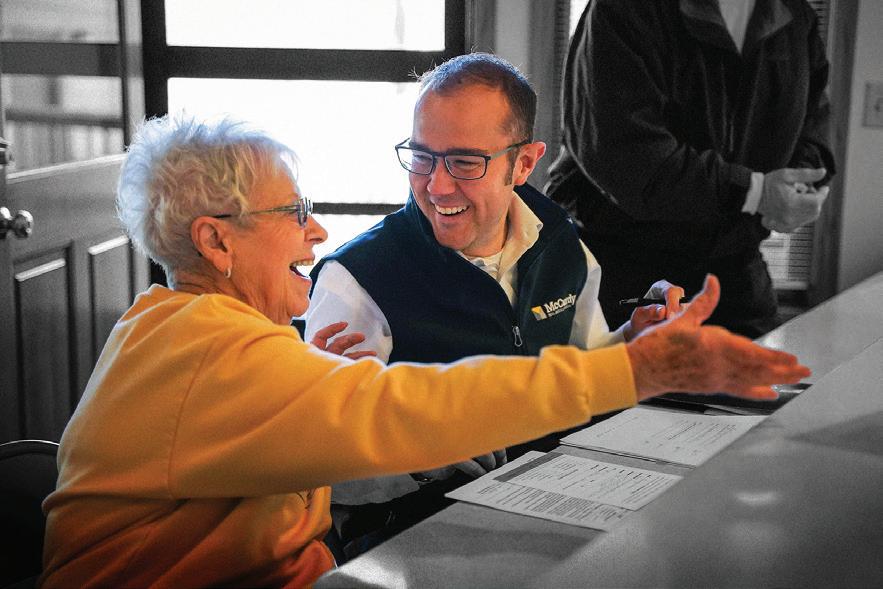
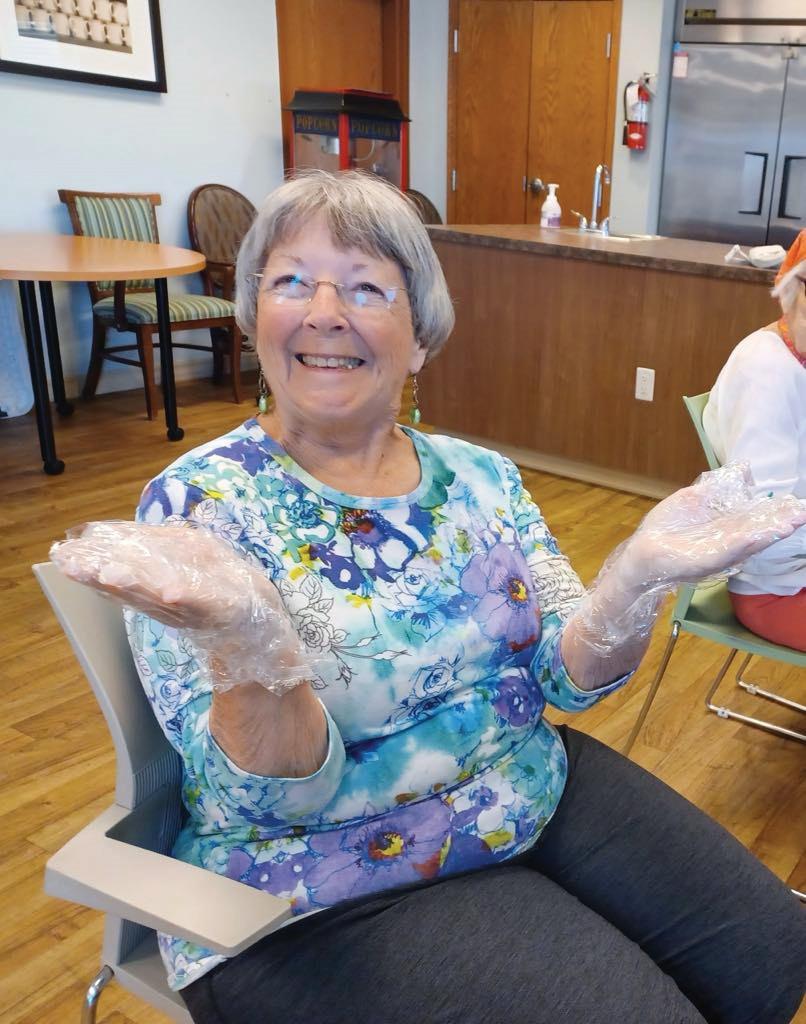


Jim Scheer, left, and his brother, Gene, have collected over 1.3 million cans to help fund Honor Flights.
to collecting aluminum cans as a source of fundraising
The cans have brought in anywhere from 25 cents to 65 cents per pound at Allmetal Recycling in north Wichita, Gene said. On the day of the Can Brothers proclamation, Allmetal CEO Clint Cornejo donated an additional $1,800 to KHF.
It takes about 34 or 35 cans to equal a pound, and the Scheers have
collected about 40,000 pounds. Beer cans make up the biggest percentage, and Gene revealed that Budweiser’s use of a controversial social influencer had changed which empties are most numerous.
“Budweiser used to be until they put that gal’s picture on that can. Now it’s about a third of what it used to be.”
Going paperless? A free digital copy of The Active Age is now available. The digital copy can be “flipped through” like a regular newspaper, and the type can be enlarged on your phone or computer. To have the digital version emailed to you each month, call (316) 942-5385 or email joe@theactiveage.com.


